Cover Collection: Rockwell or Not?
Many of the covers of The Saturday Evening Post were painted by Norman Rockwell—322 in all—but not all of our covers were Rockwells! Can you tell which of these covers are Norman Rockwell originals and which aren’t? We’ve removed the artists’ signatures to make it more challenging. You can see the answers here.
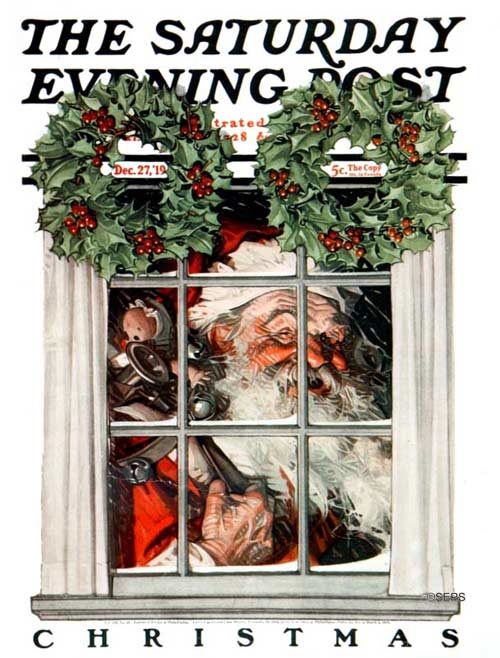
December 27, 1919
Click to Enlarge
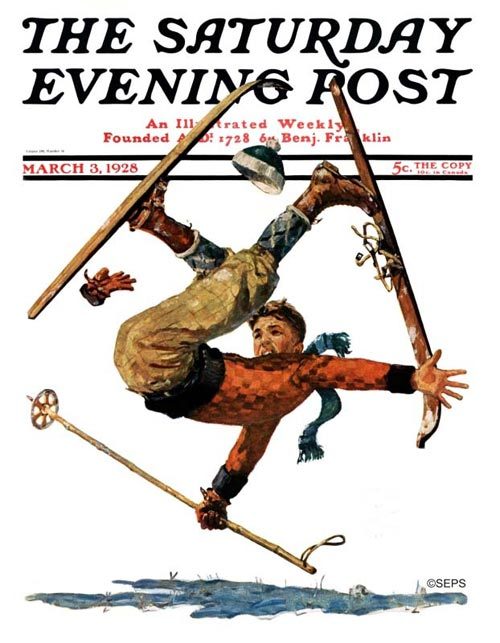
March 3, 1928
Click to Enlarge
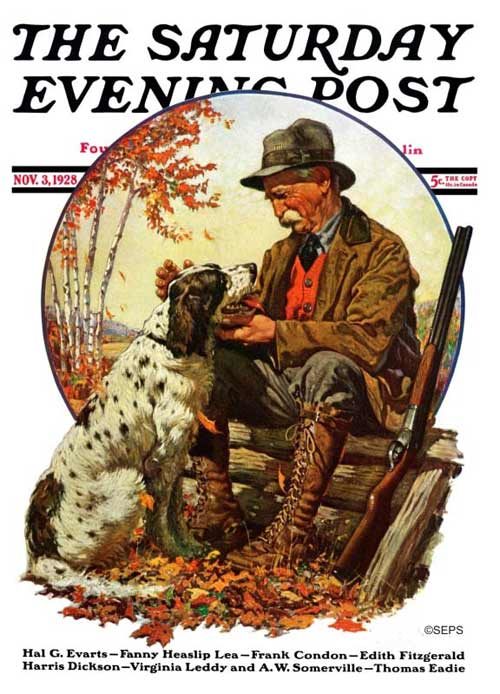
November 3, 1928
Click to Enlarge
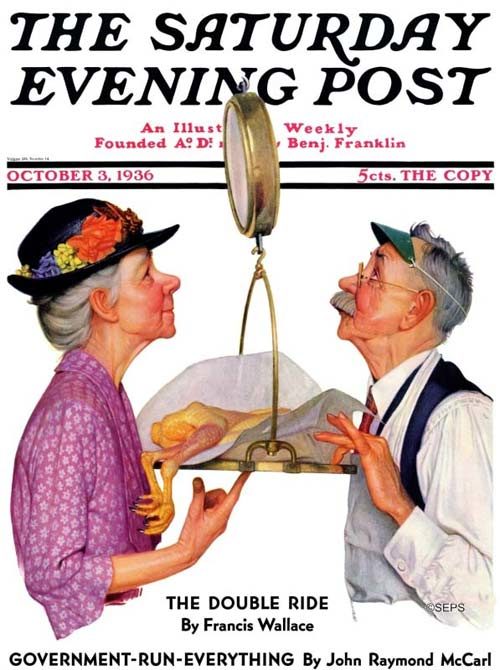
October 3, 1936
Click to Enlarge
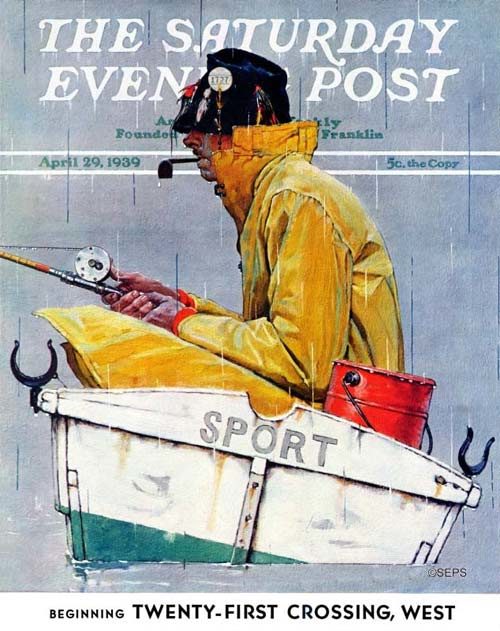
April 29, 1939
Click to Enlarge
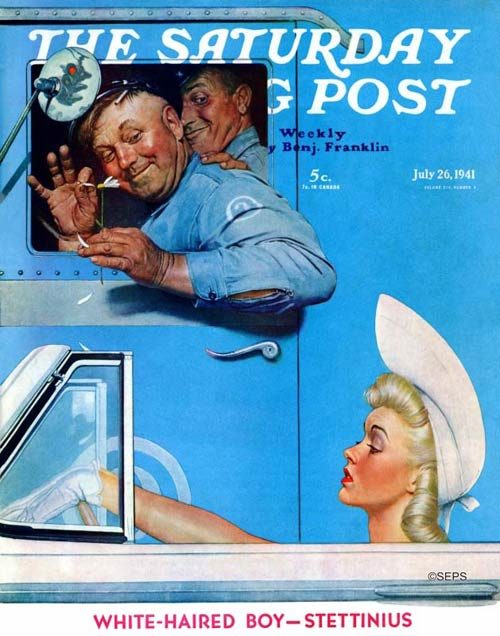
July 26, 1941
Click to Enlarge
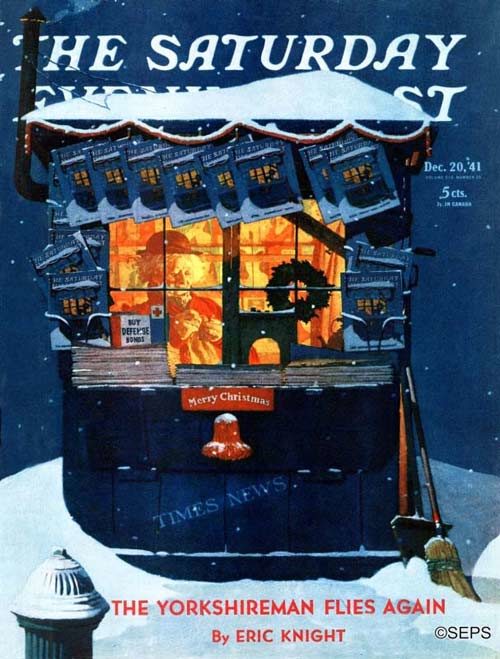
December 20, 1941
Click to Enlarge
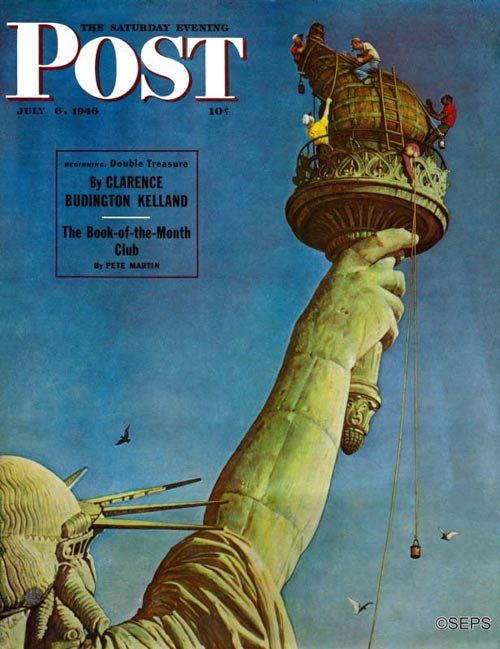
July 6, 1946
Click to Enlarge
Answers to “Rockwell or Not?”
Here are the answers to the “Rockwell or Not” cover gallery.
- Santa Behind Window, December 27, 1919: J. C. Leyendecker
- Wipeout on Skis, March 3, 1928: Eugene Iverd
- Hunter and Spaniel, November 3, 1928: F. Kernan
- Tipping the Scales, October 3, 1936: Leslie Thrasher
- Sport, April 29, 1939: Norman Rockwell
- Two Flirts, July 26, 1941: Norman Rockwell
- Newsstand in the Snow, December 20, 1941: Norman Rockwell
- Working on the Statue of Liberty, July 6, 1946: Norman Rockwell
Con Watch: 6 Winter Olympics Scams
Steve Weisman is a lawyer, college professor, author, and one of the country’s leading experts in cybersecurity, identity theft, and scams. See Steve’s other Con Watch articles.
Although the 2018 Winter Olympics in PyeongChang, South Korea, are still more than a week away, criminals are already using this popular event to cheat people around the world. Once the games actually begin, the scams will only increase. Here are some Olympics-related scams you should be aware of:
1. Championship Check Cheaters. An email that appears to come from the United States Olympic Committee offers to pay you $350 a week to wrap your car with advertising for the Olympic Games and drive around town as usual.
Unsuspecting victims who respond to the email are sent a check for more than the amount to be paid. They are instructed to deposit the check into their bank account and wire the rest back to the company. Unfortunately, the check that the scammer sent was counterfeit. The money that was wired back to the scammer came right out of the victim’s bank account.
A check sent to you that is more than the amount you are owed and comes with a request for you to send back the overpayment amount is always a scam.
2. Gold-Medal Malware. Once the games are underway, many people will receive emails and text messages purporting to contain updates, photos, and videos of Olympic events. Unfortunately, if you click on links or download attachments sent by scammers, you will end up downloading either ransomware or malware that will steal information from your computer, laptop, tablet, or smartphone and use that information to steal your identity.
Trust me, you can’t trust anyone. Never click on any link or download any attachment unless you are absolutely sure it is legitimate. Even if the address of the sender appears legitimate, the address may have been “spoofed” to appear genuine. You are better off going directly on your own to sources that you know you can trust, such as www.espn.com or NBCOlympics.com, for up-to-date information, photos, and videos.
3. The Sponsor Spoof. It’s difficult to win any lottery, but it’s impossible to win one that you haven’t even entered. Emails that appear to be from Coca-Cola, McDonalds, or any of the other sponsors of the PyeongChang Winter Olympic Games tell the intended victims that they have just won a huge Olympics-related lottery. All the victim has to do to claim the multi-million-dollar prize is pay some administrative fees or income taxes. This scam is particularly insidious because, while it is true that lottery winnings are subject to income tax, no legitimate lottery collects income taxes on behalf of the IRS. They either deduct the taxes before awarding the prize, or they pay the entire prize to the winner who is then personally responsible for paying the taxes due on the winnings. And no legitimate lottery requires a winner to pay administrative fees.
4. Skating Away with Your Money. Olympics-related merchandise — particularly apparel — is extremely popular. Unfortunately, many websites are selling counterfeit and poor-quality Olympics apparel and other Olympics merchandise.
If you are interested in Team USA merchandise, go to the official Team USA website, where you can shop safely and securely. As always, whenever you shop online, you should use your credit card rather than your debit card because credit cards give you much greater consumer protection if your information is stolen.
5. Malware Slalom. Many people will be turning to apps for all manner of useful information about the Winter Olympics, and there are many legitimate apps available, including the official PyeongChang 2018 app, which is available at the Google Play Store and the iOS App Store. Unfortunately, many other Olympics-related apps appear genuine but are loaded with malware, including keystroke logging malware and ransomware. Many of these tainted apps are found on third-party websites. When downloading apps, stay with authorized stores such as the Google Play Store and the iOS App Store that try to screen for apps containing malware.
6. Social Media Snow Job. Scammers are also turning to social media such as Facebook to send out what purport to be links to photos and videos of amazing Olympic moments, but in truth download malware when the links are clicked. Again, the best course of action is to never click on a link unless you have verified that it is legitimate.
North Country Girl: Chapter 37 — Latin Lovers
For more about Gay Haubner’s life in the North Country, read the other chapters in her serialized memoir.
After the fall semester finals, where I managed to squeak out a 78 in vile organic chemistry, I flew to Colorado Springs. I had hoped to do nothing but lie on the couch in my mom’s tiny apartment reading the dumbest romance novels I could find. But my Winter Break was spent prepping my anxiety-ridden mom for her upcoming Real Estate Agent exam (she was still waiting on that second marriage proposal), listening to one sister, Heidi, sob about how much she hated her school and every girl in it, and watching the other, Lani, pack her bags. She was moving back to Duluth to live with our dad. My mother mourned the loss of child support, but she would have gladly sent Lani to the moon to keep her away from her 21-year-old boyfriend. (Within six months, my dad signed some papers and Lani became a bride at sixteen.)
After two weeks of exhausting family drama, I flew back to waitressing, college, and full-on Minnesota winter, which meant no more riding my bike to and from work. I took the city bus to my job waitressing at Pracna, but the buses stopped running at midnight, forcing me to peel off my hard-earned ones for cab fare home, a cab that was always half an hour late; at one-thirty in the morning in Minneapolis there were probably all of three cabs on call.


Click to Enlarge
The January days ended at 4 o’clock, when the dim grey light of winter leached away. Most twilights found me hopping from one frozen foot to the other on the icy sidewalk waiting for the bus and feeling sorry for myself.
I was ignored by my roommate Liz, since I wasn’t fun anymore. Steve, my bad boy boyfriend, stopped calling, probably busy seducing freshman girls and selling bad pills to freshman boys. I looked at my roll of ones, shrunk down to almost nothing after buying plane tickets, paying for my winter tuition, and not working for the two weeks of Christmas break, and I wallowed in self-pity.

One night as I had my face pressed up against the foggy front window of Pracna, peering into the snowy frozen dark in search of my cab, I was rescued by a tap on the shoulder and a voice: “Hey you need a ride to campus?” It was Mindy, one of my favorite sister waitresses, who hustled me out to a car idling in front. Inside that toasty warm car were another Pracna waitress, Patti, and Patti’s very handsome Cuban boyfriend Eduardo, who was driving. Eduardo was at the bar almost every night, waiting for Patti and eyeing the asses of all the waitresses as we swerved around the tables. Mindy was smart, funny, and curvy, with dark, thick-lashed eyes and patent leather black hair. Her best friend Patti was a pretty, pale, flame-haired skinny girl, Lucy to Eduardo’s Ricky Ricardo.
Accepting the ride was not the bad decision. The bad decision was saying “Yeah, I guess so, for a minute” when asked if I wanted to hang out with them at Eduardo’s apartment. It was only a few blocks from my own underheated, creaky dump, where I had to let myself in on tiptoe so as to not wake either my roommate Liz or the crabby landlady beneath us. If I went home now, Mindy and Patti might think I was ungrateful or stuck-up, and I wanted them to like me.
A fancy new apartment building had popped up that fall near campus, in Dinkytown, a neighborhood known for cheap, code-violating housing. It towered like a supermodel over the crumbling duplexes and exhausted garden apartments the rest of us students lived in. I had heard that it was full of rich kids, but had never been inside.

This was where Eduardo lived. His apartment, which he had all to himself, was roomy and new, with shiny kitchen appliances, only slightly stained beige shag carpet, and plenty of heat. In the living room a ratty couch faced a littered coffee table; across the room sitting on shelves made of boards and bricks was the biggest, most complicated stereo system I had ever seen, and hundreds of vinyl records. I drooled a little.
Bob Marley crooned sweetly from out of the chest-high speakers, beers were cracked, joints were lit, and I felt a physical loosening in my chest and shoulders, which reminded me I needed to review the names of the bones in the human body for my physical anthropology class the next morning. One beer and I would go home. Maybe two.
Eduardo sat unnecessarily close to me, our hips touching, and in his charming accent said, “I apologize for my poor furnishings.” His father gave him a generous monthly allowance, which he preferred to spend on beer and pot and albums, rather than bookshelves (or books: I didn’t see a single one).
Eduardo’s family had managed to flee from Castro with quite a bit of their money. Although not nearly enough of it according to Eduardo, who held me captive for several more beers that night with his fascinating if slightly biased history of the Cuban Revolution as seen through the eyes of the very people who inspired Castro and Che to reach for their revolvers. Mindy and Patti, who had heard this tale countless times before, indulged in Pracna gossip till they passed out. Way too late, I finally thanked Eduardo and stumbled home through three-foot snowdrifts, thinking, well that was fun, I needed that, all work and no play and who wants to be dull? I promised myself once was enough, I wouldn’t make it a habit.

I ended up at Eduardo’s apartment the next night and the one after that.
Mindy, Patti, and Eduardo should have been a cautionary tale for me. All three of them were on academic probation after spending most of the fall semester listening to Bob Marley and smoking weed. Mindy was the only one who seemed concerned, but the textbooks she lugged to work and then to Eduardo’s and then back home remained uncracked. At least she bought books. Eduardo had better things to do with his money, keeping the four of us in Grain Belt beers and pot.
Eduardo wasn’t worried about being on probation. His family had just parked him at the University of Minnesota until he was old enough to join their mysterious business. If he flunked out, they would find a place for him at a college in Mexico or Spain, one that didn’t care about a transcript. Patti had decided that as the future Señora Eduardo, she didn’t need a college education either and rarely went to any of the three classes she had registered for.
Somehow I managed to keep my grades above water while doing what most 20-year-old college kids did then and still do: get shit-faced every single night. I just didn’t sleep much. I’d make it back to my dingy apartment and my disapproving roommate Liz in the morning in time to shower and change before trudging through the snow to my eight o’clock class. I told myself that as long as I never missed a class, I was fine. And I wasn’t spending my hard-earned money at an after hours club; I was just hanging out, in a warm place with very attractive people, while three little birds assured me that everything was going to be all right.
Eduardo was delighted to add a blonde to his collection; he was always stroking my hair, resting his hand on my thigh, holding a joint to my lips. I didn’t take it seriously, as Eduardo flirted with Mindy and all the other Pracna waitresses. Then one night, when my brain had punched out for the evening and Patti and Mindy had fallen asleep on the couch to the lullaby of “No Woman No Cry,” the handsome Eduardo took me by the hand and led me into his bedroom. The sex, even in my stoned and drunken state, was unremarkable, and I regretted it well before Eduardo rolled off of me and started snoring.
I have no excuse for my awful behavior outside of callow, stupid youth. I had broken the girlfriend code. I confessed to Patti the next day, as we were changing into our uniforms at work. I steeled myself for tears and yelling and the mass disapproval of the entire Pracna waitstaff, which thrived on gossip. What if I had to quit my job? Guilt and dread gripped my head and stomach in a vise but Patti shrugged it off as if I had done nothing worse than help myself to a beer from Eduardo’s fridge. She had absorbed enough of the Latin male mindset to know not to make a fuss about such a thing; she had her eye on the prize. Patti did ask me not to tell her best friend Mindy, and made sure that I never had another opportunity to be alone with Eduardo.
I was relieved and grateful that I had not been banished from Eduardo’s. I had grown to hate my charmless, chilly duplex. Liz and I lived directly above our witchy, man-hating landlady, who thundered up the stairs with her own key the moment she heard anything “suspicious,” threatening that if a boy as much as set foot on our front stoop Liz and I would be tossed out on the street where we belonged.
A brand new apartment with a cute shiny alcove kitchen in an elevator building with plenty of heat was all I needed of luxury, even though there was barely a stick of furniture besides the rumpled couch suffering from cigarette burns and many spilled drinks and that massive stereo system; in the bedroom a double mattress rested on the floor, with sheets that looked like they had never been changed, even after my escapade with Eduardo.
My drunken, stoned nights at Eduardo’s lifted me off the treadmill of work and school and the awfulness of trudging to both through the sleet, snow, and freezing temperatures of a Minnesota winter, a winter that set records in how high the drifts were and how low the thermometer plunged. Those three little birds had obviously never been through February in Minnesota.
I had thrown myself back into my hectic work schedule, taking as many shifts at Pracna as I could, closing up Saturday nights and ten hours later cheerfully serving Bloody Marys to people who worshiped at a bar. The church people arrived at one, still dressed in their Sunday best and ready for the weekend’s last bender.
Winter drives Minnesotans to drink, to search out the warmth of bars and other people, and Pracna, with the golden glow of its oak bar, polished by generations of elbows, profusion of fake Tiffany lamps bestowing flattering spots of color, and attractive and professionally friendly waitresses, was constantly packed. My shoebox stash was replenished and continued to grow, as fast as if the one dollar bills in there were mating and reproducing.
One snowy sub-zero day I was counting up my money like Scrooge McDuck and remembering that a year ago I was living on off-brand fish sticks and instant ice tea to scrape together the cash for a one-way plane ticket so I could spend six days in an old folks home in Daytona Beach.
Now my junior year Spring Break was coming up, and I was awash in dollar bills. I could go on a vacation that did not involve rooming houses or hitchhiking. My pal Liz had not mentioned any Spring Break plans of her own; we had gone our separate ways, passing at odd hours through our shared apartment, occasionally backing out of the already occupied bathroom, or silently sipping instant coffee in the morning. Patti was going to Florida with Eduardo to meet la familia. That left Mindy, who was dying to get away for a week somewhere your snot didn’t freeze the second you stepped outside, where you could wear sandals and a bikini, drink piña coladas, and meet boys. That sounded good to me too.
Mindy brought me brochures from a student travel company that offered Spring Break trips to Montego Bay or Acapulco, $299 for airfare and hotel. I voted for Jamaica. I had spent months listening to Bob Marley while smoking weed at Eduardo’s; I looked at the photo of a white sand beach and calm turquoise sea and pictured myself right there with a big blunt and a handsome Rastaman. But another Pracna waitress told Mindy that the beaches in Jamaica were overrun with packs of ferocious, tourist-eating dogs. Mindy was terrified of dogs; even my mother’s miniature poodle Shay-Shay would have sent her scrambling up a palm tree. So instead we flew off to Mexico on a chartered flight, packed with students who couldn’t wait to start drinking to wretched excess. Mindy and I navigated the flight and the bus to the hotel with only minor pawing and mauling from male Spring Breakers.

The bus disgorged us under a torn awning attached to a three-story, mildewy green building. Mindy and I stood on the sidewalk in the noon Acapulco heat, looked at the hotel and looked at each other. In no way did this hotel resemble the one in the brochure except for the name, which was La Casa Cheapo, or something similar. The sullen, non-English-speaking guy at the front desk glanced at our reservations and tossed us a big metal key attached to a heavy weight etched with our room number. The elevator doors opened to release a toxic combination of stinks and a pack of boys too hung over to even leer at the new meat. Our room did not overlook the famous Acapulco beach, but the busy, noisy Avenida Costera. The air conditioner, thick with dust, refused to work; when we opened the one tiny window clouds of car exhaust were sucked into our room. There was a urinal cake perched on top of the toilet. After emptying the drawers of roaches, we unpacked, put on our cute bikinis, and headed down to the pool, which looked like pea soup: a clot of vomit floated in one corner and two broken patio chairs in another. Mindy was about to cry. I was mentally comparing this dump to the luxury hotel my family had stayed at during a dental convention, and I snapped to a decision: “We’re going to the El Presidente.”
We rushed down the Avenida Costera to the El Presidente pool, which was exactly as I had remembered it from that trip, eight years before, the scene of so many drunken dental hijinks. Shiny sea blue tiles surrounded a huge, sparkling pool, with that eighth wonder of the world, a swim up bar. On all four sides of the pool area Tiki huts were serving oversized margaritas, frosty Sol beers, and drinks in coconuts. Rows and rows of lounge chairs held dozens of college students, boys and girls in various shades of Spring Break, from the just-arrived paper whites, to the should-have-gotten-out-of-the-sun crimsons, with a few lucky souls who can get a tan in seven days scattered about. Prominently displayed above this wonderland was a sign FOR GUESTS OF THE EL PRESIDENTE ONLY.
Mindy said, “If I have to go back to that hotel, I’m going home.” We agreed to live dangerously; if we had to, we could just spend the day getting thrown out of different hotel pools. We found two free lounge chairs and tried to look as if we belonged there.
Mindy and I were busy rubbing Coppertone on each other when two shadows fell over us. I looked up to see what was keeping the sun from bestowing some kind of glow to my pasty Nordic skin. There stood two Mexican guys, fully dressed in billowing shirts and tight pants. One looked like a younger, pudgier Cantinflas, smiley and slightly goofy. The other could have Eduardo’s taller, better-looking, older brother. He had dark brown, shoulder-length wavy hair and eyelashes longer and thicker than any offered by Maybelline; his gleaming white shirt gaped open to reveal a deeply tanned, muscular chest adorned with a thick gold chain and dangling charms: a small clenched fist in ivory, a blue eye, a half-dollar sized gold medallion. The guys asked if we wanted a drink (“Why yes, thank you!”) and introduced themselves. The tall one was Fito Giron—didn’t we recognize the famous singer? We had to have seen Fito’s poster in the hotel lobby! Fito was the star of the show at the El Presidente lounge; the other guy, the one who was doing all the talking, was Jorge, Fito’s full-time gofer and friend.
Rum and coconut drinks magically appeared and Fito scribbled on the bill offered by a fawning waiter. Mindy and I thanked Fito for our cocktails and apologized to Jorge for our ignorance. No, we hadn’t seen Fito’s act, we had only gotten to town that day. While Fito posed, hands on hips, chin cocked, hair tilted into the wind, Jorge insisted that we had to go that night to hear Fito. He, Jorge, would put us on the guest list. What were our names and room numbers?
Ten minutes trespassing and we were busted. We confessed that we weren’t staying at El Presidente but down the Avenida at the no-star hotel des estudiantes. This was shrugged off by Fito. “No importa,” he said as he looked down and locked eyes with me. Jorge was quick to jump in. “Don’t worry, your names will be on the list, you see Fito’s show and then we all go dancing!” Jorge wrote down our names, and Fito swooped down on me like a hawk to plant a kiss on both cheeks, then turned and left with a backward wave.
I was bewildered and amazed and giddy at what had just happened. We had landed dates in our first hour of Spring Break, we had free drinks in our hands, and we had successfully snuck into the El Presidente pool. To be sure that we were not at risk of getting the bum’s rush, we called over the waiter for more coconut rum drinks; he scurried over like a Mexican Groucho Marx, took our order, and let us know that everything was on Fito’s bill.
“The Poison Pen” by Thomas Beer
Jordan Bace, Second, was dreaming of strawberry shortcake piled with fine sugar and dripping redly when the afternoon mail reached Gale’s Ferry. It brought him a letter from his father, the envelope stamped with the arms of his native city, where Mr. Bace was mayor. Jordan wondered why his parent should write on two days in succession, and tore the envelope, worried.
June fifteenth.
Dear Sec: ‘Sorry to say that the freshman-crew race will not be witnessed by any of your affectionate family. Just recieved a wire from California that Edwin Joyce has died in Pasadena. The body is to be sent here and, of course, I am to be a pallbearer. The funeral is the day of your race. This is too bad, and we are all mighty sorry to miss seeing you perform, but please remember that Mr. Joyce was your grandfather’s partner and a great friend of mine. Doris is mad as a hornet. She has quite a collection of clothes she was going to air in New London, and I expect she thinks the Yale-Harvard regatta will not be the same without het shining presence, especially as quite a herd of young women seem to be leaving here to see the show. Well, good luck to you, and please don’t strain your heart unnecessarily.
Your affectionate father.
P.S. I notice that I have misspelled “receive” above, and I think I have made a mess of “unnecessarily,” though it may be right. Hot weather always affects my spelling. They never did teach me to spell “receive” at the little old red schoolhouse.
Jordan chuckled. The little old red schoolhouse of his father’s infancy was a family joke. Mr. Bane had been reared in England, while Jordan’s grandfather managed the branch of a New York bank in London. But he could spell nothing accurately. The fact had been used against him in his campaign for the mayor’s office.
“What are you laughing at?” the freshman coxswain sniffed crossly, rubbing cold cream on a blistered neck.
“My people can’t come to the races,” said Jordan.
“What’s funny about that?”
“Just the way father puts it. Have you any sisters?”
“Four,” the coxswain sighed.
“You poor pup!” Jordan said, and went off to bathe.
He could figure the wrath of Doris exactly. She hated funerals, and she had been looking forward to a week of New London. Inevitably several of her dearest friends would come to the regatta; and she had spent some days of early May shopping in New York, with an afternoon at New Haven added. He reflected that her interest in the Yale-Harvard races was not solely based on his position in the freshman boat. The reflection rose again when she met him at the station the evening he arrived.
“You were lucky to be away for the Joyce funeral, Sec. It was simply frightful. There were quantities of old women from that orphanage, or whatever you call it, that Mr. Joyce built, and they all sniffled and it was horribly hot. And there wasn’t the slightest reason why mother and I shouldn’t have gone to New London. No one would have known whether we were there or not, you know. And it’s too bad your boat was beaten.”
“But it wasn’t,” said Jordan.
“Why, it was, Sec! It was in the papers.”
“The freshman four got licked,” he corrected her — “we didn’t.”
“Oh, I’m so glad,” said Doris, straightening her hat. “But really father’s so silly about things. I do wish you’d talk to him, Sec. And poor mother always gives in like a — like a baby.”
“I didn’t know that babies gave in,” Jordan grinned, “and where did you get that hat? It’s awful.”
The hat was covered with reddish flowers in the character of violets, and it concealed a corner of her forehead. Jordan thought it somehow out of keeping. His twin had pale-yellow hair, and the rosy glitter above gave her an air of the theater, not quite desirable. As usual, she did not answer his objection, but smiled amiably and went on.
“Anyhow, mother and I motored down to Columbus for Kitty Fleming’s wedding, and that wasn’t bad fun. Quite a lot of people from Philadelphia. She’s married a man from Philadelphia — Rotherhythe Kemp. Did you get cards?”
“Yes, I did. And if he’s anything like his brother in my class she’s going to have an awfully nice time before she gets divorced,” Jordan grunted.
“Oh, don’t get Middle Western,” said Doris, haughtily bowing to their former governess, who was wheeling a perambulator along the sidewalk under the horse chestnuts.
“I can’t help being Middle Western any more than you can,” Jordan snapped; “and Eddie Kemp’s as big a rotter as —”
“Some of the ushers,” said his twin, “were quite all right.”
She gave him a slow and meditative smile, suggesting that some of the ushers had been well investigated. Jordan thought heavily of the freshman cox swain. Really four sisters seemed excessive. However, Doris was pretty and not nineteen. Girlish vanity had to be excused in some measure.
“There’s a dance at the Bulkelys’ at nine,” she said, “and I suppose they wouldn’t mind if you came. It wasn’t supposed to be a children’s party, though.”
“Go to — Tophet,” Jordan ordered.
“But you aren’t awfully old, Sec,” she said more pleasantly, and patted his knee.
“I hate dancing in hot weather,” he told her, “and this is my first night at home.”
The Bace house stood on a small crest of the residence district, and air from the lake blew genially through the dining room. Also Mrs. Bace had commanded a strawberry shortcake of the proper breed. His parents seemed enchanted by Jordan’s ravages in this dish.
“I should think you’d explode,” Doris drawled.
“You haven’t been in training for years,” said Jordan.
His lesser brother, George, took up the defense of Jordan’s appetite. He alleged that he had seen Doris eat three slices of shortcake. Doris smiled at the small boy calmly.
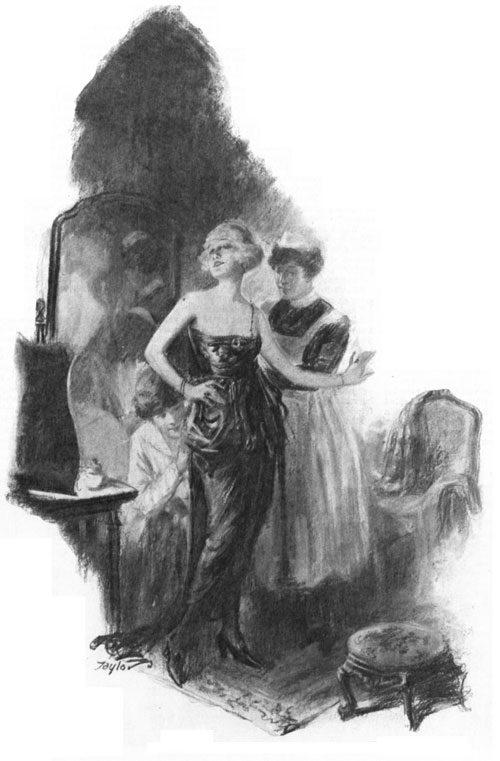
“Children are always pigs,” she murmured, and her eyes seemed to view afar off that remote age when she had eaten three slices of strawberry shortcake. She tapped her fingers on the edge of the table and lapsed into some secret, amused contemplation. Young George after a moment rolled up his napkin and hurled it at her shining head. It missed.
“Oh, Geordie!” said Mrs. Bace.
“Bad shot even for a southpaw,” Mr. Bace commented.
Doris stroked her hair.
“You might try a saltcellar,” she said, and rose, the sleeves of her negligee wavering like moth wings in the candlelight, roamed off to dress, humming the love song from Louise.
“I’ll kill her sometime,” George muttered.
“Oh, Geordie!” said Mrs. Bace, helpless and shocked.
“I wouldn’t kill her,” Mr. Bace observed, “unless you’ve got the pocket money for a good lawyer. It’s always hard to explain things like that to juries, son. They’re so prejudiced.”
“Oh, Dan!” said Mrs. Bace.
“Give Sec some more cake, Molly,” the mayor yawned, “and let us be cheerful while the higher criticism’s putting her clothes on.”
“I think I’ve had enough,” Jordan said regretfully, and lit a cigarette.
“Oh, Sec,” his mother stammered, “are you sure those are good for you?”
“I guess from his looks that they won’t ruin him,” Mr. Bace remarked. “He’s in pretty good condition, I take it. Go on about the race, Sec. We’ve had it interspersed with sections of the latest fashions, and really I’d like to know just what happened. Give Sec some coffee, Molly.”
It struck Jordan that his father was speaking with a strained sharpness instead of the familiar level note, gently English, that sounded always agreeable in any room — and there were some gray additions above his ears. His sleepy eyes had a fresh patch of wrinkles at the corner.
“You’ve been working too hard,” Jordan accused him.
“Hot weather, Sec. Go on about the race.”
Doris came in to say good night to her relatives, and Jordan pondered on the strings of vermilion beads sustaining her frock. He hoped, they were strung on some solid substance. But it was a charming gown. She looked like an inverted peony, and her small feet were shod appropriately in gold.
“I had it made to wear at New London,” she said, “and Nancy Guest says the party at the Griswold—”
“Oh, Doris,” Mrs. Bace broke in suddenly, “let’s not talk about New London any more, please.”
This outbreak had all the value of a high-explosive shell. Jordan stared at his mother. It truly sounded as though Doris had been talking too much of the missed race. It must be that. His twin was considering Mrs. Bace with a pained bewilderment.
“Oh, very well, dear. Any signs of Johnny?”
“His visibility is still low,” said Mr. Bace through his cigar smoke, “and that is a mighty pretty dress — frock. You look like the late Lola Montez a good deal.”
“Oh, Dan!” Mrs. Bace gasped, and pink touches appeared in her cheeks.
“Sure, I don’t know who Lola was,” said Doris kindly, “but it sounds like a slam. There’s Johnny. He always takes a bit off the rose bed. Good night.”
Jordan wondered if the best breeding permitted a young man to sound his horn outside the doors of a gentleman’s house summoning his daughter forth. He strolled over to the window and watched Doris flutter into the motor, where Johnny Rhodes was sprawled gracefully.
He had a natural admiration for young Rhodes, a great figure in white flannel, with a curly dark head that showed fully as the motor slipped under the lights of the dining room outflung on the gravel.
“If Doris marries that mucker,” said George, “I’m goin’ to run off.”
“Oh, Geordie!” Mrs. Bace moaned.
“That’ll do, son,” said Mr. Bace, and rose. “Well, I’ve got to go down to the club and blackball some men. Be back in an hour, Sec.”
When the family car had carried him off Jordan asked questions, having planted George over a volume of Gale’s Ferry snapshots. Mrs. Bace was never expansive.
“There’s been a lot of trouble with the police force, Sec, and it’s been dreadfully hot. It would have been such a rest for him to go East. It was too bad poor Mr. Joyce had to die just then and” — she flushed “and — really — Doris wasn’t very — very nice about missing the races. I suppose we should have found a chaperon for her and let her go. And there’s been some trouble at the bank with one of the tellers. And of course, dear, your father isn’t young.”
“I suppose Doris just simply raised hell.”
“Oh, Sec!”
“I’m sorry, mother. Look here, is she going to marry Johnny Rhodes?”
“I hope not,” said Mrs. Bace with more firmness than she usually mustered. “I’m sure I hope not, Sec.”
“Of course,” Jordan mused, “there’s his D. S. C. and all that, but — I hope she doesn’t. I don’t mind his being divorced, but —”
Jordan played golf considerably, and Johnny Rhodes had a clear, carrying voice in the country-club dressing rooms. His theories on matrimony and finance were memorable. Still he was jolly and handsome, and there was the medal. Jordan frowned.
“You and dad can put your feet down —”
“Oh, Sec, Doris is so old for eighteen!”
Jordan grinned and went off to talk to George. His brother illuminated the matter of Mr. Joyce’s funeral when they had gone to bed. He sat on Jordan’s floor and barked with the note of one long oppressed but now sure of a hearing.
“Sounded like a baseball game when everybody’s jumpin’ the umpire. She said dad was old-fashioned and stuffy and mid-Victorian and —”
“Oh, she’s got that mid-Victorian thing? Go on.”
George continued at some length, including his own grievances in the business of having his Navajo Indian headdress borrowed for the country-club masquerade in April and so lost.
“But Sid Conway says he’ll get his cousin in Arizona to get me another. Sid’s a peach, I think. He’s got a lot of sense too. He don’t hang round Doris the way he did.”
“That’s too bad,” said Jordan drowsily.
“It is not! Why, gee, you wouldn’t want a nice fellow to go and marry a thing like her? But how much does a coxswain have to weigh, huh?”
Jordan stirred somewhat when a motor rattled in the drive toward dawn, but he was deeply asleep when George shook him at ten.
“Get up, Sec! Say, something’s happened!”
“Dad isn’t sick?”
“No. He’s mad, though, and mamma’s cryin’, and — it’s some kind of something. Get up!”
George was inarticulate and clearly a little frightened. Jordan hauled on a dressing gown and trotted downstairs through the shuttered coolness of the wide house to the dining room. His sister’s voice detained him outside the door.
“Nonsense! I shan’t let you do anything of the sort. I’m not going to have a lot of cheap detectives and things mixed up in this. I —”
“I’m not going to have my daughter insulted through the —”
Doris laughed, not merrily.
“Of course, father, if you like publicity —”
“Oh, Doris!”
His mother’s open anguish brought Jordan into the room on the run. Mrs. Bace was still crying wearily. His father stood on the hearth slashing at the white flowers in the grate with a napkin. Doris was trying to tidy her hair with fingers that shook. “Some low hound has been writing your sister anonymous letters,” said Mr. Bace. “That’s what’s the matter, Sec. Look at it!”
“It’s a woman of course,” Doris alleged — “not a man. Do keep still, father.”
The letter was typed on a sheet of plain paper. Jordan read it hastily, wishing that his mother would stop crying.
Dear Doris: Really you are getting too much for a civilized community. That red hat you were wearing yesterday has given me a headache, and I am not quite well yet. No wonder your brother looked ashamed of you when you were bringing him up from the station. And when wearing red do remember that face powder should be used sparingly — if at all. The contrast is too marked. You had the effect of a rather ignorant chorus girl trying to look like a second-rate French actress.
As to the horrible thing you were wearing at the Bulkely dance last night, words fail me. Please understand that I have no objection to your going about half naked. It is being done, and the gown was no worse than some others there. But that cheap swagger of yours would be tolerable only in a raving beauty. If your idiotic father has not the sense to check you up it is time someone else did. Au revoir.
“I’m going to ring up the police head —”
“You’ll do nothing of the sort,” said Doris, cutting Mr. Race’s sentence neatly. “You told us yourself that things like that always leak out of the police office. And there’ll be reporters at the Conway tea. I’m not going to have them telling people some woman —”
“How d’you know it’s a woman?” Jordan asked.
“Oh, really, Sec, a man wouldn’t bother about clothes! And it’s all about clothes. Of course it’s a woman!”
“But the hat isn’t really red, darling,” said Mrs. Bace. “It’s a cerise — and do try to drink some coffee, dear. You mustn’t wear yourself out.”
“I’m not!”
Jordan looked at the torn envelope. It was postmarked from the city-hall station, and dated from yesterday of course. He found himself mastering a grin. But he effaced this, as his father was staring at him, and it would not do to smile over a letter in which Mr. Bace was called idiotic. “It’s a dirty trick,” he said, “and can’t the police —”
“Oh, don’t be childish!” cried his sister, and walked out of the room.
“It’s a damned outrage,” said the mayor, chewing his lip.
“Oh, Dan,” wailed Mrs. Bace, “do be calm! I mean — you can’t be calm, dear — but do eat something.”
Mr. Bace refused food and set off for his office. Jordan puzzled, drinking coffee.
“I didn’t like that hat an awful lot,” he said. “It’s rather loud. And that dress isn’t what you’d call quiet, mother. Of course girls wear things like that, but —”
And the facts did not at all excuse this piece of blackguardism. Jordan worked himself into a fair measure of wrath as the day progressed. His sister was his sister. He might find cause to criticize her privately, but no stranger should be allowed to. This must be some jealous woman of course. He seldom went to such dances as his years permitted. He prided himself on a disdain for gossip. He had never even fancied himself in love. Perhaps it was a duty to squire Doris about and note her rivals.
“I’ll come to this tea at the Conways’ if you want, mother.”
“Oh, you’re not asked, Sec. It’s for some English author — Sir John — who is it, darling?”
“Sir John Pelton, the one who wrote all those novels about Scotland. It’s a very grown-up tea, Sec,” Doris mentioned, wandering about the veranda.
“Read any of his novels?” growled Jordan.
“One or two.”
“I’ll bet against it,” said Jordan. “They aren’t fluffy stuff.”
“Oh, Sec!”
“What you need,” said Doris, “is a course in manners. You aren’t the only person in the family who reads, you know. I’ve got to dress.”
Mrs. Bace looked after her unhappily, and turned her pale face to Jordan when the click of heels had ceased.
“Doris does read, Sec.”
“Not enough to hurt her any,” he smiled.
“She’s very young, dear.”
“Hour older than me, isn’t she?”
“But you’re a boy,” said Mrs. Bace, settling the question. She patted him and went on: “And really girls don’t read as much as they did, or they read such odd things — Freud —”
“I see Doris wading into Freud,” Jordan choked.
His father did not go to the Conway tea, and came home wilted, late for dinner. Mrs. Bace fussed over him with suggestions of iced coffee and spoke almost sharply to the butler about the misguided electric fan. She was, Jordan thought, in an anguish of solicitudes.
Dinner embraced all the things Doris liked best, and George had been privately warned to keep his mouth shut. But Doris was cheerful.
“Sir John’s quite nice,” she said, “and not stiff at all. And his son got the Victoria Cross. I really like middle-aged Englishmen better than the young ones. They don’t seem to want to talk about themselves so much. Of course young men all do.”
“He did talk to you quite a long time,” Mrs. Bace nodded.
“What did he say about the Irish question?” Mr. Bace inquired.
“I didn’t ask him. Does he know anything about it?”
“He’s supposed to be something of an authority. He’s written three books on it, and so on.”
“Great Scott,” said Doris, “what a bore! Englishmen always seem to like politics. He asked me about some senator or other.”
“He must have learned a lot from you,” Jordan reflected.
Doris ate an almond and looked at her twin for a moment.
“I suppose you’ll grow up — if you ever do — to be a college professor or something. Why should a man want to learn anything when he’s talking to a girl?”
“Speech sometimes does imply an exchange of ideas, daughter,” said Mr. Bace mildly.
“Oh, Dan!”
“Thanks so much,” said Doris.
In the morning George appeared at Jordan’s bedside with news of more misery. But Mr. Bace had left before the morning mail arrived, and Doris was alone with her second letter.
“There weren’t more than fifty people at the Conways’ yesterday, and a lot of them were men. But this is worse. So silly too.”
She hummed while Jordan read the note she had received:
“Doris Darling: I am glad to note that the red hat was not on view yesterday. Still that orange suit was not all it should be. All right for a tennis tea and that sort of thing.
“You are clever about your ears too. I know how big they are, and the arrangement of the hair hides them very well indeed. The emerald ring was striking, but out of place.
“A reception for a literary celebrity, my girl, is not the same as a bride’s luncheon, you must remember.
“But what I principally complain of is that you monopolized Sir John for twenty minutes when there were many people three times your age and with twenty times your brain power waiting to talk to him. Moreover, it was rotten bad taste to ask if his son had been decorated. A glance at the headlines of yesterday’s paper would have informed you that his son was also killed in action.
“That fatheaded lunatic, your father, should make you read the papers. I suppose he is too busy grafting to pay any attention to you.
“God forbid that I should say a word against your mother. You have bullied her from the day of your birth, of course, and she is probably so cowed by this time that she does not dare lift her voice. I suppose, too, that she lets you dress like a cannibal queen because she had to dress on nothing a year as a girl. Clergymen’s daughters don’t get big allowances, do they?
“But she shouldn’t let you knock about with swine like Johnny Rhodes, dear. Yes, I know he’s fond of you. You probably remind him of Tottie Toothbrush, or whatever the name of that red-stocking blonde was that he married in 1912. Your mentality must make the same strong appeal to him. More later. I am sorry for your family, because the reaction to these little jabs at your self-conceit must affect them unpleasantly. I suppose you take it out on the servants too. So long.”
Doris hummed a moment when he had finished, and stared at him steadily.
“Mother’s gone down to talk to father. Really I didn’t think Sid Conway could be such a cad!”
“What on earth has Sid Conway got to do with this?”
“He was sitting on the window seat while I was talking to Sir John. That’s the only way — and we had a row in April. And, of course, he hates Johnny Rhodes.”
“I don’t think so. He’s always spoken mighty well of him, and they were in the same regiment. You’re wrong anyhow. Sid’s a gentleman.”
“He keeps giving me long lectures on — all sorts of things, and he’s just as stuffy and old school as father. It is Sid.”
“Junk!” said Jordan. “Sid wouldn’t say a word against dad anyhow, and he wouldn’t mention mother. It’s someone else. And did you talk to this Englishman twenty minutes? That’s where you let yourself in for it, sis. Who else was listening?”
“It is Sid — and if Sir John didn’t want to talk to me he could have left me. I want you to go and —”
Jordan flashed up into a queer anger. He was fond of Sid Conway, and no amount of evidence would make him swallow the accusation.
“Sid’s thirty nearly, and he’s known us all our lives. If he wanted to tell you what he thought of you he’d have done it out like a man. I shan’t go see him. Go see him yourself.”
“That’s pretty!”
Jordan was ashamed of himself promptly. Doris never wept. Now her eyes filled, and she looked at him across the breakfast flowers with a sort of fright. He pulled at the cord of his dressing gown.
“All right,” he mumbled, “I’ll go see him. But you’re all wrong.”
“You really like Sid, don’t you?”
“Of course I do.”
“Why is it men stick together so?”
“They have to. There are too many women loose round. We’ve got to protect ourselves.”
“You don’t talk so badly as you used to,” said Doris. She sat silent for a second, then flushed. “And I don’t take Johnny Rhodes seriously. That’s why this is so silly. It’s — it’s uncalled for, Sec. Give me the paper.”
Sidmuth Conway was a burly young man, who had taught Jordan how to use an air rifle ten years before, and still gave him good advice from time to time. He was amateur middleweight of the city. Jordan thought of this as he motored into the hot heart of town. The silly errand seemed likely to get him a lesson in boxing for which he had no wish or use. Sid, though, was patently glad to see him, and his expression was not guilty when he spoke of Doris.
“I was wondering if she’d be home tonight. No, there’s the Wallace wedding. Going?”
“I hate weddings,” said Jordan. “If you’d been a page as often as I wag! Are you going?”
“Not for love or money. Too hot. But I want to see Doris.”
Sid hesitated, rapping his pipe on his desk and blinking at the fan that wagged its revolutions from side to side.
“Fact is, Sec, I’m worried about Doris.”
“Are you?”
“Yes — like this: A girl can make an awful fool of herself without knowing it or meaning to — and she did yesterday. And, of course, she didn’t realize it — naturally.”
“I suppose no one does,” said Jordan.
“Of course not. Well, Sir John saw her and asked to be introduced. She was looking awfully pretty, and she started talking to him. They were sitting on the window seat, and a lot of people rather hung round, looking at the great man and all that. And, you know, her voice carries.”
“Like a freight car,” Jordan agreed.
“Anyhow, she said some things — it was rather funny, one way of looking at it — only it wasn’t. And after the party I motored him down to the club, and there were a lot of fools talking in the smoke room. Anyhow, it made me sore — and your father walked in to get some cigars. I’m afraid he heard some of it. But what I want you to — to think about telling her is that —”
“She shouldn’t make a fool of herself?”
“Oh, not so strong as that! But I don’t like hearing her get herself criticized any more than I would you, Sec.”
“Come and tell her so,” Jordan offered.

“Well,” Sid said, moving-in his chair, “we aren’t getting along very well just now; and you’re her brother — and I was thinking of writing her. Only that’s so idiotic, seeing that I live across the street, and all that.”
He waved his pipe to indicate assembled reasons. Jordan wiped his, forehead and beamed at Sidmuth.
“Do you write your letters or type them?” he asked with skillful yawns to suggest that the subject bored him.
“Type? I don’t know how. I’m like your dad. I’ve tried to learn and can’t. Fingers too stiff or something. But about Doris —”
With intricate guile Jordan discovered that Sid liked the peony dress and the cerise hat.
There wasn’t any flavor of dissimulation in the statements. Sid was plainly worried. The city was full of rank outsiders who envied the old families, and Mr. Bace was mayor on the reform ticket. Well, it was too bad that anyone should lift the smirk of criticism against Doris.
“And she jumps down your throat if you tell her her hat isn’t on straight,” Jordan nodded.
“It wasn’t her hat,” said Sid. “It was her paint at that fool masquerade after Easter. There was too much on her chin. Made her look as though she’d been eating raspberries and hadn’t wiped her mouth. Perhaps I didn’t put it right. I’m not much of a diplomat. But I’m a lot older than she is!”
“I don’t think it’s much of a game, being diplomatic with Doris,” Jordan told him. “Try a brick.”
“Rot! You’ve got to consider a girl’s feelings. I hadn’t any business to say all this to you, anyhow.”
“It’s just as well you did,” Jordan said darkly, and withdrew.
Sidmuth Conway, he felt, was guiltless; and any guilt attached to these letters was balanced somewhat by their tone of raillery. Doris let herself in for it. It was about time, he thought, that something was done to Doris. She did bully their mother. Her clothes alarmed him often, and her conceit was flourishing.
“You’re wrong about Sid,” he said curtly, “and I told you so.”
Doris was cutting the leaves of a novel. She looked at her twin sulkily.
“I suppose you went and said, ‘Hi, have you been writing Doris anonymous letters?’ And he said no, and that was all there was to it.”
“I didn’t do anything of the kind! And he likes that rotten dress too.”
“He would,” said Doris. “I hate the rag. It’s the wrong color. It’s what one gets for buying evening things by daylight.”
“You liked yourself pretty well in it the other night,” Jordan pointed out.
“Oh, stop talking like Geordie!” Doris cried, and threw the novel into a corner. She went on breathlessly to state that Jordan had no right to discuss her with Sid in any case, and finished with a thorough condemnation of the city from the street cleaning department to the architecture of the church they attended. “And, of course, father had to go and make us conspicuous by getting himself elected mayor.”
“You didn’t mind that when he was elected.”
“Do you think I’d be getting these beastly letters if he wasn’t mayor?”
“I think if you dressed like a human being, and didn’t try to hog all the men in town, you wouldn’t be getting anything but bills,” Jordan said hotly; “and don’t ask me to go snooping round to any more people asking fool questions either. No one ever named me Holmes.”
“I shan’t ask you to do anything else in a hurry, dear,” Doris hissed. “You’re as bad as father.”
“That’ll be all of that, please,” he retorted. “I notice that all you’re worried about in these letters is what this person says about you. Doesn’t seem to bother you having him — or her — call dad a fatheaded idiot and a grafter.”
“But that’s —”
“If you say that’s so I’ll just naturally kill you!” Jordan shouted.
“I wasn’t going to say anything of the sort. I was going to say that’s just as silly as the rest of it. And I don’t suppose you would care if I was killed,” she said with a waver of the voice that prophesied tears.
“I would though. I hate wearing black.”
“Ah,” she declared, “that’s the masculine sense of humor!”
Jordan began to reproach himself in an hour and came to terms. The girl was restless and pale. Mrs. Bace murmured over her all afternoon and the mayor brought home a box of the best chocolates to console her. But Doris was not in the mood for chocolates, and it took the whole female staff of the house to dress her for the Wallace wedding.
“Poor kid,” said Mr. Bace, “it’s very hard on her, Sec. She’s young, and she likes gay clothes and all that. It’s a cowardly sort of trick. Of course the police can’t do anything under the state laws unless the letters get scandalous.”
“I think calling you a grafter is pretty scandalous!”
Mr. Bace arranged his white tie and shook his head.
“Calling a mayor a grafter’s just ordinary repartee, Sec. See if you can trim this nail down for me, will you?”
The finger nail was broken a little from the edge, and the crack was blackened as if with coal dust.
“How did you do that, dad?”
“Blessed if I know. Run and order the car. It’s almost time to start.”
Jordan was proud of the family, setting off for the wedding. Doris looked well in white and silver. Mr. Bace carried evening dress splendidly, and of his mother Jordan was in no way critical. He wandered over to play dominoes with Sid Conway and spend the evening coolly. By his sister’s attitude, when she came home, he fancied a successful party. The next day was calm. The mail contained nothing odious and peace seemed planted in the house again. But Friday morning George — as scout — reported more trouble.
“Mother’s awfully mad this time,” he announced, “and father says he’s going straight to the police. Better hurry.”
“Oh, Sec,” said Mrs. Bace, “don’t get excited!”
“I want you to go down and stay in the post office all afternoon,” the mayor scowled. “I won’t have this sort of thing.”
“I think it’s really r-rather funny,” Doris said in a reduced tone, as though she spoke through veils. Jordan took the letter and his baked apple to the dining room window seat.
“Well, Doris, you are doing better. That white gown was all right, though the beauty spot on the right shoulder blade merely accented the fact of your skinniness and added nothing to your charms. And it was pleasant to see you shake hands with Mrs. Wallace as though you did not feel her far beneath you.
“Still you should not have told Mr. Wallace that Sec is too young for evening parties. Mr. Wallace has the bad taste to be fond of Sec, and is well aware that you are Sec’s twin. Sec, though an ass in some respects, is not all bad for a Bace. I don’t think he would have tried to talk about André Gide to that fat woman from New York without some idea as to whether Monsieur Gide is a dressmaker or a butcher.
“For your information I may tell you that the fat woman is writing a book on American education, and you will probably figure in it to your discredit. Beware of discussing foreign letters without reading them. It betrays a lack of common sense.
“And why apologize for your father’s job as mayor? True, he is no good at it, but that is characteristic of mayors. And as he has the misfortune to be your father, he is probably too worried by that responsibility to attend to his duties at the city hall very thoroughly. I suppose most of the missing funds for the new orphanage are on your back. It’s amazing that your mother’s hair hasn’t turned, and it is a pity that you will never be what she was. See you in church Sunday. Bye-bye.”
“He’s strong for you, mother,” said Jordan; “that’s one thing for him. What new orphan asylum is he talking about, dad?”
“I’m blessed if I knew there’d been any trouble with the fund. I’ll have to get hold of the charity commissioner and see.”
“And I do know who André Gide is,” said Doris. “I read some of that book about — about trees, or whatever it is. But you shan’t turn this over to the police, father. It — it isn’t very serious. It’s just some — some person with a poor sense of humor. And we’re going to Watch Hill next week anyhow.”
“He doesn’t seem to have an eye on Geordie,” Jordan chuckled.
“Oh, Sec,” said Mrs. Bace, “don’t — don’t speak of such a thing!”
After the morning bombshell Friday went peacefully. Doris decided to work in the rose garden, and after lunch Jordan saw her taking over an armful of blossoms to Mrs. Conway, whose flowers had suffered from some pest. This thoughtfulness was uncommon, and Jordan was touched. He pondered while driving George down to the dentist. Really this dose of critical advice was doing the girl some good. He somehow wished that the critic would supply him with notes on his own behavior. If he was in some respects an ass it would be quite as well to know them. The observer had hit his twin’s defects clearly.
He sat in the motor outside the office waiting for George and watched the people on the sidewalk about the Postal Building. Why, any one of them might be the traducer of his father! He shifted, frowning. Queer that the writer found nothing kind to say of Mr. Bace. Everyone liked him. Queer that his father didn’t resent it more keenly. A truly patient man, his father was — and Doris must be a fearful expense. Jordan rubbed his nose. Things were expensive. His own bill for haberdashery at New Haven was not small. Children cost a good deal, and Doris was never so grateful as she should be. She took things for granted. Jordan’s conscience wriggled uncomfortably. Well, at least he always said thanks, and his father seemed contented with him.
“Let’s go over and see if dad’s ready to go home,” George suggested, scrambling into the car.
The mayor’s outer office was empty except for the secretary.
“There isn’t anyone with him,” she said to the boys, “but he said he didn’t want to be disturbed. He had some mail to look through. Shall I go see if —”
Mr. Bace came .out of the inner office, hat in hand, as she spoke, and pinched George’s ear.
“I’ll be ready in a minute. I’ve got to run across the street for a second. Hang round. Don’t fool with the city property, Geordie.”
George began a conversation with the secretary, and Jordan strolled into the private office, a horrible place, decorated with oil portraits of earlier mayors and photographs of more recent sufferers in the cause of government. The furniture was built of high-polished redwood and carved with griffins and pine cones. Even the little typewriter stand had its sheathing of dusty gilt scrollwork. Jordan gave the municipal taste a shiver and walked to the window.
His father was plodding over the dull brick street in the simmer of heat toward the Postal Building. He was not long inside its brightly gleaming glass doors, but on the return a shabby man buttonholed him at the curb, and Jordan watched what must be the beginning of a long argument. Finally, he moved back to the typewriter table for a match and stood contemplating the machine. He had tried to use the one at the house occasionally, and now yawning with the delay he rolled a fragment of paper clumsily into the apparatus and pressed down a key. The businesslike click amused him. He wrote a line of random letters, then a key stuck and he patted it briskly with a finger. The nail snapped.
“Oh, the devil!” said Jordan, and reached for his pocket knife.
Afterward he thought that the key must be rather soiled. The crack had a thread of black along it. He was looking at this uneven edge in his bathroom before dinner, when it seemed that he had seen a nail broken so not long since. Where and on whom?
As he walked down to dinner he began to grin and had to stop outside the dining room door to adjust his face.
“Where’s Doris?” he asked.
“She’s stopped at the Conways’ for dinner,” said Mrs. Bace so cheerfully that Jordan laughed.
“The weather doesn’t affect you, Sec,” his father smiled.
“I’m all right. Are you coming on to Watch Hill with us, sir?”
“Not for a week or two.”
“I’d better stay here and keep you company.”
“Nonsense! Run along and keep cool, Sec.”
“I’d really like to stay here, sir. I could come down and be office boy.”
“I wouldn’t have you at the office for a million a day,” said Bace. “But you can stay if you want to, son. But do you want to?”
“Of course I do,” Jordan insisted honestly, “and that’ll get me out of helping straighten the cottage up. Doris’ll have to work.”
“Oh, Sec!”
“I’d like to see Doris workin’,” said George.
“You’re too ambitious,” Mr. Bace observed.
“Oh, Dan!” said Mrs. Bace.
Sunday church was hot, dull and restless. George wiggled aimlessly, and Doris glared at him across her father. Jordan looked about the scant congregation warily. There might be some noting eye upon them, and his father appeared to be asleep.
“That beast said he’d see me in church,” said Doris as they walked home, “and Sid wasn’t there. Of course I was wrong about Sid, anyhow — and I suppose I was horrid to you the other day, Sec.”
“Oh, that’s all right. And whoever it is can’t say anything about your clothes this trip.”
“Oh, yes he can,” she said miserably.
Under her veil her chin shook faintly, and Jordan hoped the next letter would be less acid. But on Monday morning she whirled into his bedroom while he was thinking of getting up and threw him a letter.
“I can’t stand that sort of thing, Sec. I don’t mind the rest of it, and — and I suppose some of my things are too — too but — oh, Sec, there isn’t a word of that true!”
She thrashed up and down the room, her rosy skirts fluttering and her hands clenched. Jordan rubbed his eyes and read.
“Doris, your Sunday get-up was perfect — just gaudy enough to show off your good points and not at all theatrical. The absence of powder was also pleasing. In time and with practice you may learn to go along unassisted by these little hints. Your inattention to the sermon was justified by its dullness. As to your attitude toward your kid brother, I thought it unnecessarily rude. Remember that George is only twelve, and therefore naturally wrigglesome.
“I wonder what you were thinking of most of the time? The extreme coolness with which you received Johnny Rhodes’ bow justifies me in the conclusion that you are bored with him.
“What does a young woman of your sort think about anyhow? Clothes and men and bank accounts, I fancy. I was wondering what would happen to you if your witless father happened to lose all he has stolen here and there and then drop dead. Probably you would expect Jordan to turn in and work for you. I can’t imagine you doing anything for yourself. You might make a competent housemaid with a little practice.
“After all, though, you are pretty safe. It must be satisfying to you to know that your father’s investments are solid and his life is insured for a pretty large sum. He looks worth about five or six years more if he does not land in state’s prison, and after that you will be very well fixed.
“They tell me you are off to the seashore soon. Heaven help your poor mother! I suppose she will have to sit about and watch you play the fool all summer. Well, dear, au revoir. We will meet soon again.”
“Pretty stiff,” said Jordan, discreetly scratching his chin.
“Look here, Sec, I can’t stand it! I don’t mind what they say about me. I don’t care, but I can’t stand it. I’ve never thought about father dying! I don’t care how much money he has! He’s always been so — so awfully kind to me — I —”
Her sobs began to hurt him. Jordan jumped out of bed and went to pat her back awkwardly.
“It isn’t fair,” he said. “It’s too bad.”
“And he isn’t well. I was thinking of that in church. He does look tired. It’s been a bad winter, and — I suppose there were too many parties. But I can’t stand this! Go and get Sid. He’s a lawyer. He knows all about things like detectives. I won’t have father called a thief! Some of the things about me are funny. But that isn’t, and I won’t stand it. I’ve got some birthday money left. Go get Sid, and — and if we can find who this is I — I want you to horsewhip him.”
“Good kid,” said Jordan.
“And don’t dare tell father about this — this thing!” She ripped the paper in her fingers. “I’d die if he thought anyone thought that I thought — oh, you know what I mean!”
Jordan gentled her up the hall into her own room, then went to his father’s quarters, where Mr. Bace was shaving.
“Doris wants me to get Sid Conway to hire detectives and all that.”
“’Nother letter?” said Mr. Bace sideways through his lather.
“Yes. This one’s perfectly rotten, and not a word of it true. It’s beastly. Doris,” Jordan muttered, “is an awful fool some ways, sir, but she isn’t — well, as bad as this letter makes her out, and she’s all busted up. She says if she can find the — the person that wrote it she wants me to horsewhip him.”
“Go ahead and retain Sid,” said his father. “Sid’s a good lawyer. All busted up, is she?”
“Into chunks, sir.”
“Poor old girl,” said Mr. Bace, and sighed.
Sid Conway and Doris had many consultations on the veranda before Mrs. Bace took her off to Watch Hill, and Jordan was left with his father in the empty house, where a flight of post cards from the departed daughter began to drift in on every mail.
“She writes a vile hand,” Mr. Bace said, studying one.
“She ought to learn the typewriter, sir.”
“Pretty hard, Sec.”
“Yes,” said Jordan, “and awfully hard on your nails.”
“Is it, son?”
“Awfully.”
Mr. Bace lit a cigarette and went on studying the last post card.
“She can’t write, but she spells decently, Sec.”
“I wonder,” said Jordan, “if she can spell things like ‘receive’ and ‘unnecessarily’ and all that?”
“Sure your allowance is big enough, Sec?”
“Of course, dad. Shoot you a game of pool?”
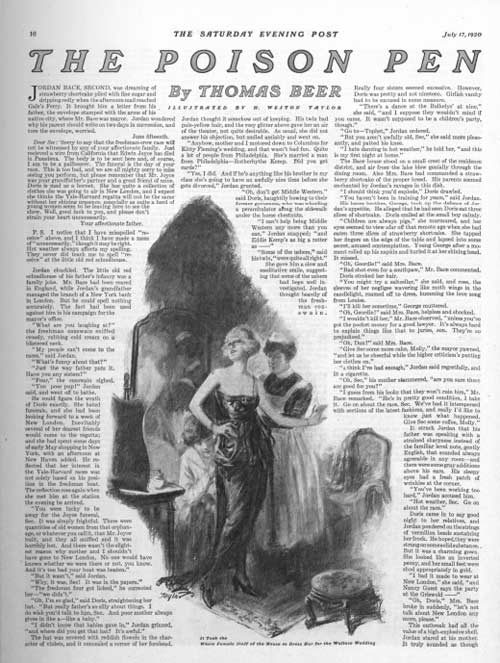
Your Weekly Checkup: Dealing with Hearing Loss
“Your Weekly Checkup” is our online column by Dr. Douglas Zipes, an internationally acclaimed cardiologist, professor, author, inventor, and authority on pacing and electrophysiology. Dr. Zipes is also a contributor to The Saturday Evening Post print magazine. Subscribe to receive thoughtful articles, new fiction, health and wellness advice, and gems from our archive.
At a movie last night, my wife and I traded queries several times. “What did he say?” we’d ask each other. We’d heard the spoken words but they were uninterpretable sounds, failing to register meaningfully in our brains.
Hearing loss is a major cause of disability in the U.S., especially as the population ages. Approximately half of persons older than 60, and 80% of those older than 85, experience hearing loss severe enough to impact daily life. Impaired hearing is associated with increased rates of hospitalization, falls, dementia, depression, unemployment, lower income, and death. Annual health care costs for hearing impaired persons are considerably higher than for those with normal hearing. Hearing loss is the fourth leading cause of disability globally.
Hearing impairment can be of two types: conductive and sensorineural. Conductive hearing loss can result from simple wax build up in the ear canal or from more extreme conditions such as middle ear infection or fixation of bones in the middle ear (otosclerosis.) Medical or surgical treatment of conductive hearing loss often restores full hearing.
Sensorineural hearing loss results from cochlea (inner ear) dysfunction or damage to the cochlea’s nerves, caused by degenerative processes associated with aging, genetics, noise exposure, and drugs toxic to the ear, such as some antibiotics, chemotherapeutic or anti-inflammatory agents. Hearing loss can also be genetic, affecting about 1 in 1000 live births.
Hearing impairment in the adult (presbycusis) most often results from age and genetic related degenerative changes in the cochlea and the accumulated effects of exposure to noise and ototoxic drugs. It is usually bilateral, impacts higher frequencies, and reduces the ability to understand spoken words even if the sound is loud. My wife and I have this type.
Approximately 25% of U.S. adults have hearing loss from chronic exposure to loud noise. I often think of this when a car pulls alongside at a stop light with the radio blasting so loud I can hear it with the windows shut; or when people attend a concert with the sound amplifiers exploding; or ride for hours on a noise-shattering motorcycle. The blare damages delicate sensory hair cells of the inner ear that convert sound to neural signals for the brain to interpret. The damage can be temporary or permanent, depending on the extent of the noise exposure.
Hearing loss is also associated with smoking, diabetes, and obesity, suggesting that changes in blood vessels may play a role. Sudden sensorineural hearing loss, perhaps due to viral infection or a vascular or autoimmune event, is considered an emergency since steroids can be helpful in some instances.
For the hearing impaired, hearing aids can be useful, but often make spoken words louder, not necessarily more understandable. Cochlear implants can be used to bypass the impaired hair cells and electrically stimulate the auditory nerve.
Hearing is one of life’s critical functions. Protect yours by reducing contributing factors such as noise pollution and smoking. Consult an otolaryngologist for an evaluation if you have decreased hearing. Treatment can change your life.
My Wood Stove
We bought our first house 20 years ago, still live there, and will die there if we have any say in the matter, which I suppose makes it our last house, too. It’s not a perfect house — the kitchen, where we spend all our time, is on the north side of the house and doesn’t get much sunlight — but the house is otherwise suitable and fits us well. The best feature is the kitchen woodstove, which we fire up in fall and keep burning through late winter or until we run out of firewood, whichever comes first. Like most purchases I’ve made, it was impulsive but has given us more pleasure per dollar than anything we’ve owned.
I haven’t yet discerned whether we own the stove or it owns us. A man who heats his home with a woodstove has unwittingly signed up for a full-time job: cutting, hauling, and stacking firewood seven months of the year to stay warm the other five. Except for this man, since I hire a woman named Kelly to bring me firewood each fall. Kelly drives a school bus in our town and cuts firewood the rest of the year. It would be selfish of me to cut my own firewood when Kelly so obviously wants the work.
This still leaves plenty of work for me, carrying the firewood in from the fence row to stack on the back porch, waking early each morning to load the stove, tending it through the day, staring at the fire each evening contemplating matters great and small. Devoting one’s life to reflection can be tiring, and many evenings I fall asleep while staring at the fire, exhausted by my labors.
One of my favorite things to think about while seated by the fire is how much better the world would be if everyone were seated by a fire. While gazing at a fire, I’ve never thought ill of someone else or wished them harm in any way. Indeed, just the opposite has happened. A man I didn’t care for once appeared at our door on a winter’s evening. I invited him in and ushered him to a chair in front of the fire. We sat for a pleasant hour, philosophizing, and by the time he left, we were thick as thieves. The United Nations should have a woodstove instead of a dais.
Our stove was made in Norway by a company named Jøtul, which has been making stoves since 1853. If our woodstove had been made in China, I probably wouldn’t have bought it, but I liked the idea of it being built by Norwegians. I’m sure Chinese workers do just as good a job as Norwegian workers, so I don’t know why I feel the way I do. I don’t like what it says about me that I automatically assume Chinese workers are less devoted to quality. The Forbidden City Imperial Palace in Beijing was built in the early 1400s and is still standing. I’m fairly certain it wasn’t built by Norwegians. If it had been built in America, we’d have torn it down and put up a Walmart. This is the kind of thing I think about while seated by the fire.
I should probably mention that we have a second home, my wife’s ancestral farmhouse in southern Indiana. We put a Jøtul woodstove in it last spring, so now I can think down there, which has thrown my whole life out of whack since I go there for the express purpose of not thinking. Lately, I’ve been thinking that owning two houses with woodstoves is wearing me out, and I should sell one and live in the other. Except now I am a prisoner, bound by cords of memory to the first house where our children were reared, tied by marriage to the second, where my wife was raised. And so, come winter, I own and am owned, captor and captive alike, lighting one fire while dousing another.
Philip Gulley is a Quaker pastor and the author of 22 books, including the Harmony and Hope series featuring Sam Gardner.
This article is featured in the January/February 2018 issue of The Saturday Evening Post. Subscribe to the magazine for more art, inspiring stories, fiction, humor, and features from our archives.
Heroes of Vietnam: My Son, the Soldier
 This article and other features about America in Vietnam can be found in the Post’s Special Collector’s Edition, The Heroes of Vietnam. This edition can be ordered here.
This article and other features about America in Vietnam can be found in the Post’s Special Collector’s Edition, The Heroes of Vietnam. This edition can be ordered here.
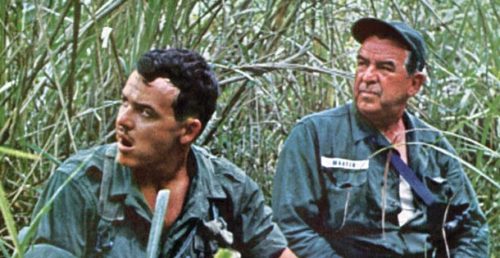
—This article is excerpted from “My Son in Vietnam” by Harold H. Martin, originally published July 16, 1966, in the Post. The complete story as it appears in the original magazine is available at the end of this article. —
From San Francisco to Saigon, and from Saigon to An Khê, and now, on this rocky footpath leading under tall trees to his foxhole, I kept wondering what to say when I finally found him. Don’t get emotional, I kept telling myself. Don’t embarrass him in front of his friends. Play it cool. Say something flippant, like, “Private Martin, I presume,” or better still, just play it straight. Just say, “Hi, John, how’s it going?”
We came to the crest of a little rise, and Platoon Sgt. Zubrod, who was guiding me, stopped. “There he is,” he said. Thirty yards ahead, three troopers stood around a little fire, drying their rain-soaked shirts. For a moment I didn’t recognize him. From babyhood he had always been a chubby guy, built solid, like a brick. Now he was lean as a summertime rabbit, burned black by the sun. He wore a thin black moustache and dark glasses, and his hair, cut short, was curly.
We were very close before he looked up and saw me. “Good Goddlemighty!” he said. “What the hell are you doing here?” He stuck out his hand.
“I was in Saigon,” I said, “but they kept shooting up the place, so I thought I’d better come up here, where it’s safer.”
He grinned and poked me in the stomach. “What’s with the pot? I had a letter from Mama saying Hollywood was after you for Moby-Dick. They want you to play the whale.”
Suddenly he remembered his manners. “Excuse me,” he said. “Dad, this is David Crosby. He’s on the machine gun with me. And this is Robert Ellsworth. He’s in the next hole, on the 90 mm recoilless. Dave … Bob, the vision you see before you is my father.” He nodded toward the huge platoon sergeant standing beside me. “I see you’ve already met the Papa Bear.”
Sgt. Zubrod grinned. “You got everything you need?” he asked me. “Okay, I’ll get on back to the C.P.” With a walk that was remarkably bearlike, he set off down the trail to the log-and-sand-bagged bunker that was, at the moment, the command post of the outfit I’d come across the world to find — the 1st Platoon of Bravo Company of the 2nd Battalion of the 5th Cavalry Regiment of the 1st Cavalry Division (Airmobile) — now deployed 11,000 miles from its home at Fort Benning, Georgia, at a place called An Khê in the central highlands of South Vietnam.
Darkness was coming. We stood on the flanks of a gentle slope; behind us, the rising ground was covered with a thin forest of slim, white-barked trees, with an underlayer of low, thick scrub. Before us, down the slope, was the raw slash of the defense perimeter, 400 feet wide, that encircled the huge cavalry encampment. It was called the Green Line, but there was nothing green about it. Every tree and bush had been cut and burned, and the rough land smoothed off so a crawling man could find no defilade. It was a formidable barrier-in-depth of barbed wire — five rows of great loose rolls of concertina wire fastened to stakes — and between the rows of wire had been planted various explosive devices.
Fifty yards back from the nearest wire were high watchtowers, 30 of them in the 18-mile circuit of the camp. They were manned by machine gunners during the day, and at night by specialists operating sensitive watching and listening instruments. Between the watchtowers were the sandbagged gun pits where riflemen, machine gunners, and grenadiers stood guard from dark till dawn. Back of them, in the woods, were the mortar batteries, and back of the mortars the 105s and the 155s and the big 175s that throw a 400-pound projectile more than 20 miles, and behind them — on a field called the Golf Course — were the helipads where the gun ships stay on call. At the center, protected by all this bristle of guns and wire and minefields, was 1st Cav headquarters — the hospitals, supply dumps, chow halls, chapels, and office tents of division command.
In the other direction, beyond the wire, lay Viet Cong country — swamps and high grass and thin forest land of pine and palm trees where, until a few months ago, “Charley,” the Viet Cong, prowled at will. Now our patrols traversed it by day and set ambushes beside its trails and clearings at night. Far out, 4 miles beyond the wire, was a picket line of scattered outposts, lightly manned but able to bring down flare ships, gun ships, and artillery fire on Charley the moment he was spotted.
The Green Line was a barrier behind which the 1st Cavalry could stay forever, if it chose. From here it could fly its battalions out to harass Charley wherever he might be hiding in the hills, and bring them back to rest and refit in safety. High on the flank of Nui Hon Chu’o’ng, a mountain rising in the center of the encampment, was the mark of permanence — a huge black horse’s head on a yellow field — the shoulder patch of the division done in concrete. It was visible for miles, a defiant challenge to Charley.
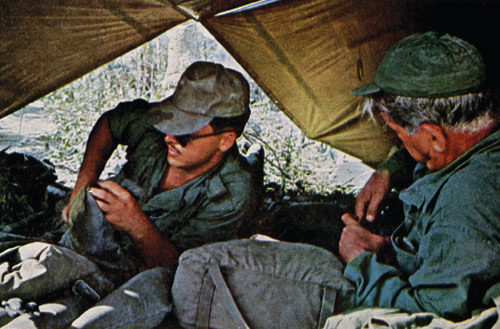
In the sector where we were, the gun pits were still raw holes dug into the white sandy earth, and it was in one of these that my son and his friends fashioned me a shelter for the night. They stretched a poncho across a corner of the hole where, when not on guard, they slept on the ground beside their guns.
“Okay, Papa-san,” John said. “Blow up your air mattress and throw it down. Use your pack for a pillow and your poncho liner as a cover. Put your canteen close at hand and rub on some bug juice to repel the mosquitoes. Then all you’ve got to do is kick off your boots, and you’re ready for bed. I think I better warn you, though, we’ll probably have company tonight.”
“Charley?” I asked.
“No,” he said, “Sergeant Locklear. He walks the line about two o’clock in the morning to see if the guys on sentry duty are awake, and he always falls in this foxhole. There are other visitors too. Last night I dreamed that I was twiddling my fingers in my hair. It was so real I woke up. Then I realized I was sleeping with my hands folded across my chest. So I reached up and grabbed, and something fuzzy went ‘skeeeek’ and ran down my chest and out of the hole.”
“Did I ever tell you,” I asked, “about the time on Okinawa when the rats ate Captain Buchanan’s moustache?”
“Yes,” he said, “you told me.”
“It just goes to show,” I said, “that down on the rifleman’s level, wars don’t change very much.”
All up and down the defensive line, though, as the platoon got ready for night, it was evident that this war had changed from anything I remembered. In a cleared place in front of the platoon C.P., helicopters were whirring in, dropping their loads of weary, sweat-soaked troopers. They’d been out all day, John explained, working out a new way of dropping men in rough terrain. Before, they had been going into clearings, or open paddies in the valleys. In forest country, these clearings were rare, and Charley had rigged them with booby traps and encircled them with guns.
“It makes for a pretty hairy operation,” John said. “The choppers go in low and flare out over the drop zone. If the drop zone’s full of logs and brush and downed trees, you have to jump from the chopper while it’s hovering maybe 6, 8 feet off the ground, and with all the gear you are carrying, you hit with a hell of a thump. Being the machine gunner, I’m the first out, and as I jump out, I feel the chopper begin to lift. Sometimes the ammo bearer, who is the third guy out, jumps from a chopper that’s already 12 feet in the air. He hits like a watermelon rolling off a kitchen table.
“Since there’s a good chance Charley’s got a welcoming committee waiting, there’s always a lot of shooting before we get there,” he said. “The artillery’s first. Then the gun ships go in with rockets to beat up the brush around the drop zone, and the gunners in the choppers are firing as they come in. Sometimes, when the landing zone is too rough, we go down rope ladders, but this takes longer and the chopper pilots sweat it. It keeps them in the area too long.”
The newest technique, he explained, gives an airmobile outfit a great deal more flexibility in its assault landings. The choppers now hover over the forested hilltops, and the troops slide down into and through the tree canopy on long nylon ropes, using the same rappelling technique which enables mountain climbers to bounce down the sides of steep cliffs. This frustrates Charley, who can’t guard every hilltop in the highlands.
It was nearly dark as the last helicopter landed. John brought his machine gun down from the tower to set it up for the night. A slow drizzle began to fall as he set up the gun. Fascinated, I watched him, a stranger to me now — a professional working at his trade.
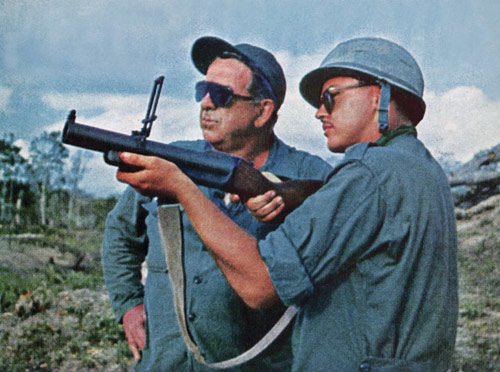
Through the drizzle a slim, blue-eyed sergeant appeared, trailing a thin wire behind him. Beside the gun he laid a rubber-covered device that looked like a hand stapler. John introduced us. “Sergeant Richardson has been out in the wire, arming the claymores,” he explained. Richardson reached into a sandbag and pulled out a putty-colored curved device, the size and shape of the back of a stenographer’s chair. “It’s a plastic explosive,” he said, “with little lead balls imbedded in it. You can burn it, shoot it, stomp it, or drop it and it won’t do anything. It takes an electric charge to set it off. That’s what this thing here is for. It’s the detonator. You attach it to this wire that leads to the claymore and squeeze it, and blam — old Charley gets his butt full of marbles.”
Off to the east, a bright star suddenly blazed in the sky, hung for a moment, and began a slow descent, silhouetting the distant hills.
“Flares,” John said. “Somebody out on the picket line thought he saw something, or heard something, so he asked for some light. You see that gap over there? The highway from here to Pleiku runs through it. Charley loves to set ambushes there. And we love to set ambushes for Charley there. So nearly every night there’s a lot of shooting in the pass.”
A shadow loomed above the hole.
“How many fillers you need?” a voice said.
“Three,” John said.
“You get two,” the voice said. Then, in a hoarse whisper, “the password’s ‘Coffee — Song.’”
The big shadow moved away, leaving two smaller shadows standing in its place. They were the “fillers” — clerk-typists from the artillery batteries who pulled guard duty on the barrier line with the shorthanded rifle platoons.
I stood the first watch with John. We talked in low tones, while behind us the mortars coughed and the howitzers banged, and the deep explosions shook the hills. I remembered the decision that had brought him here.
“I guess that answers a question I was supposed to ask you,” I said. “About how you’d feel about transferring out of this outfit. I know a guy …” I stopped, and there was a long silence.
“No,” he said. “Leave it alone. I appreciate it. But I trained with these guys, and I came over here with ’em, and I fought Charley with ’em. I was in the hospital with a bunch of them. So I think I’ll see this through … with these same guys … as long as I’ve got to stay over here.”
I asked him how long that was, and he said he didn’t know for sure. The tour was a year, and every man can tell you, to the day, how much of the year he still has to serve. But, John told me, there was a big fat rumor going around that, for the guys who had been in combat, it was going to be cut to 10 months. “If that’s true,” he said, and you could hear the hope in his voice, “I’ve got it made. My tour started the day I cleared San Francisco — November 28, 1965.”
The length of his tour is about the only facet of U.S. policy that profoundly concerns the foxhole soldier. He does not waste time philosophizing about whether this is a just war or not. He’s in it, and there’s nothing he can do about it but fight, and survive if possible.
“What do you think about when you are standing guard out here?” I asked.
“Home mostly,” he said. “Wondering if the reality of getting back will be anywhere near as good as the dream.”
We talked on. He seemed to feel not anger, but a pitying contempt for the anti-war demonstrators. “People say they ought to be drafted and sent over here,” he said. “We don’t want ’em. Nobody would want to go into combat having to depend on one of those guys.”
“Actually,” he said, “I’ve got more respect for Charley than I have for those people. At least Charley will fight, and when you think about what he’s got to fight with, you wonder how he keeps resisting. No air, no real artillery except anti-aircraft weapons, nothing but small arms and a few mortars. No way to get about except on his two flat feet, wrapped in old tire retreads.”
“The time your platoon got ambushed — was there anything you didn’t tell us?”
“Not much,” he said. “We came down off the ridge into a dry paddy, and Charley let loose. I got zapped in the leg and crawled down a ditch toward a big water-filled hole where old Papa Bear was assembling the wounded. I found another guy in the tall grass and pulled him along. We finally got air strikes in there, and they smashed Charley, and the medevac choppers came in and lifted us out.”
By now it was 11:15. John moved off in the black dark to wake the artilleryman who would take over the guard.
Dawn came like a Chinese painting, with a gray mist drifting in the hollows of the distant hills. David Crosby, who had the last watch, went out to disarm the claymores, and the men of the night patrol, their green fatigues black with rain, came home through the mists like tired ghosts.
At the end of the company street, John peeled off the muddy, sweat-stained greens he’d been sleeping in for a week and stepped under the thin warm trickle of the improvised shower. Just above the knee, on the side of his left leg, I saw the long, red scar where the bullet had gone in, traveling upward through the thigh muscle. Just below the hip joint was a longer scar where the doctors had cut the bullet out.
“Judas Priest!” I said. “You did get zapped.”
“Yeah,” he said. “Next time it’s my turn.” He soaped happily. “Don’t get the idea, though, that I’m thirsty for revenge. If I never see Charley again, it’ll suit me fine.”
Late that night the platoon got the word that it had been looking forward to, half in eagerness, half in dread. The safe, but boring, days were over. The 2nd Brigade, to which the battalion was attached, was leaving the Green Line. The next morning, Bravo Company would move out on a 10-day search- and-destroy operation in country somewhere north of Pleiku.
“‘Search and destroy’ is like killing sharks in the Gulf Stream,” a trooper from Florida said. “You chum some bait and throw it overboard, and when the shark comes around, you shoot him. But he usually gets a bite or two of the bait before you kill him.”
In these operations the infantry serves as bait. Since Charley is essentially a guerrilla, he will not do battle unless he is sure he has the advantage. To tempt him to show himself, therefore, the searching units are small. When he does reveal his position, the world falls in on him. Planes and helicopters roar in with napalm and rockets, and artillery pounds him mercilessly. The Viet Cong dead may number 40, 50, 100, or more. American losses will be described as “light” or “moderate,” which they well may be in terms of the division, the regiment, or the battalion engaged. But the squad or the platoon which ran into Charley in the first place may have been pretty well wiped out. The planes and choppers don’t always get there quick enough.
On the night before the operation, Capt. William A. Taylor, commander of Bravo Company, called his platoon leaders to his tent to brief them on their mission. The area the brigade would be going into, he said, was supposed to contain a corps headquarters, protected by at least a company — perhaps by a battalion — of Viet Cong. There were Montagnard villages throughout the area, he said. They were fortified and believed to be unfriendly.
“But,” he added, “remember this when you check out the villages — DO NOT FIRE UNLESS YOU ARE FIRED UPON. I repeat: Do not fire on any village unless you get fire from there.
“Another thing,” the captain went on. “There will be no fraternization. Nobody will go into a native hooch for any purpose except to check it out.”
It was almost midnight before the briefing ended. In the BOQ tent, Lt. Keith Sherman, age 23, commander of the 1st Platoon, sat down to write his wife a letter. Down the company street the word of the company’s mission had spread fast. From the squad tent where John slept came the sound of singing. As I came into the tent, John looked up and saw me. “Come in, Papa-san,” he said jovially, making room for me on the bunk. “Sit down.” He took the canteen cup from another trooper and handed it to me.
The gulf that lies between the generations betrayed me. “You better get yourself physically prepared,” I said. “Why don’t you guys knock off the yodeling and get some sleep?”
There was a sudden silence. In the dim light of the candle, they looked very young, but they were not children to be scolded and sent to bed. I tried to cover up. I stood up and pretended to yawn. “Sorry,” I said, “I keep forgetting that you guys are about 30 years younger than I am. At your age you don’t need sleep.”
He followed me as I went out into the company street. We stood there for a moment in the dark. Finally, “Look, Dad — about tomorrow,” he said. “Patrolling off the Green Line is one thing — that country around there is pretty well secure. Tomorrow will be different. We’ll be in Viet Cong country. And if you get in tall grass and lose the man in front of you —”
“I get the message,” I said, “but don’t worry. I didn’t come out here to try to fight the war with you. I’m not that stupid. I wanted to try to tell the people back home how the plain old dog-faced, dragtailed, dead-eyed, bone-tired, foxhole soldier lives as he fights this war.
“So, about tomorrow — don’t sweat it. I’ll make the assault landing with you. Then I’ll stay in the landing zone while you guys strike out through the boondocks. And unless something comes up, I’ll leave you tomorrow night.”

I thought, when he said good night, that he sounded relieved.
Morning came early. To a chorus of birdsong, the company moved out along a rocky road to the field where the helicopters waited. Climbing aboard, the troopers fell strangely tense and silent. There was no wisecracking, no horseplay. For many of them this was their first operation. For others, including John, it was the first since the ambush at Bông So’n had decimated the 1st platoon. Out of 37 men, two had been killed and 24 wounded; of the wounded, John and eight others had returned to duty. Silently they climbed in, settled back against the bright-red nylon web of the backrests, dropped their chins on their chests, and went to sleep.
There was a roar and a blast of blessedly cool air as the choppers lifted. In the open ports, machine gunners hung on their safety straps, watching the ground below.
I stood up and peered over the chopper pilot’s shoulder. Soon below us we saw the gun ships swimming back to base. Ahead was the landing zone they had just finished pounding. Dust and smoke rose from it, and there was fire in the brush, for the preparation had been thorough. Artillery, fixed-wing planes, helicopters, each in turn had pounded it. Now, as the gun ships pulled away, the lift ships roared in. We flared out, touched down, and the troopers poured out the back of the Chinook and landed running, headed for the brush. The chopper lifted and was gone. And all at once I was alone in an open field, in an eerie silence.
I headed for the bushes to the east of the field. Soon I saw men with weapons moving ahead of me in the thicket. The battalion sergeant major came up. The colonel was asking about me, he said. I followed him to where Lt. Col. E.C. Myers, the battalion commander, was making a quick check of the area. Back with troops after a tour in the Pentagon, he had the look of a happy man. Nearby there was the muffled boom of an explosion and a billow of yellow smoke. The troops, moving through the brush, were tossing smoke bombs into the openings of a network of tunnels. When the smoke cleared, he said, men would go in to check them out. But they looked as if they had been abandoned. Everywhere, in the open field where we landed, there were square holes, hip-deep, dug in the red earth, and in the bottom of these holes, sharpened bamboo stakes had been set in place. But the holes had not been covered over with the thin covering of twigs, earth, grass, and leaves that would turn them into deadly traps. Charley, it was obvious, had recently been here, and in considerable numbers. But he had gone.
“Souvenir,” he said. “Take it home for me, please, and hang it on the wall in my room.”
Pretty soon there was nothing else for us to talk about.
“Well, so long,” I said. “I’ll be seeing you around Christmas, I guess.”
“I hope so,” he said. “Give mother my love.”
“I will.” I stood there a minute, trying to think of something else to say. “You guys take care of each other, David,” I told his friend.
“We’ve done it so far,” Crosby said. “We’ll keep on.”
As the chopper soared up, heading for Pleiku, I saw among the shattered trees below the raw earth of a new foxhole. A trooper was standing beside it. It might have been him. I couldn’t be sure, for it was getting dark and beginning to rain. He, or one of his buddies, it didn’t matter. They are all good men.
Postscript: John Martin made it home safely the following year and finished out his military career with distinction, training new recruits for their own tours in Vietnam.
—“My Son in Vietnam,” July 16, 1966
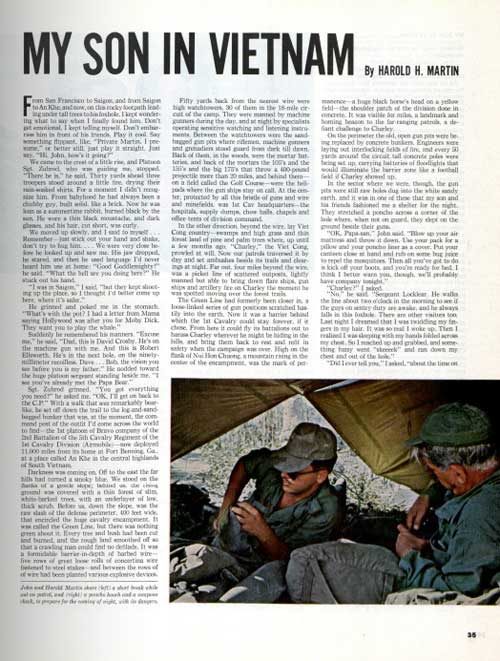
Goodbye to Beetle Bailey Creator Mort Walker
We were saddened today to read of the passing this weekend of Mort Walker, the creator of Beetle Bailey and Hi and Lois, among other comic strips.
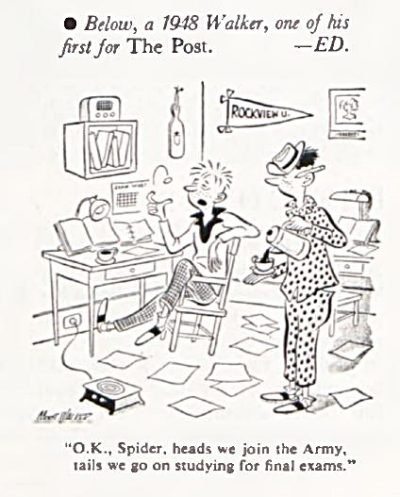
You can’t really say Mort Walker got his start at The Saturday Evening Post. After all, by the time he submitted his first cartoon to the Post, he had already sold cartoons to multiple magazines (his first at age 12), worked at Hallmark as chief editorial designer, and served as an intelligence officer in the Army during World War II.
But the progenitor of Beetle Bailey did made his first appearance in the Post. An editor here—John Bailey—encouraged Walker to create the lazy college student “Spider,” who eventually morphed into Beetle Bailey. The cartoon was eventually syndicated to 1,800 newspapers in more than 50 countries.
We are honored to have been even a small part of Mort Walker’s long and funny career.
The 5 Most Memorable State of the Union Addresses
Ever since George Washington, the American president has given an annual message every year. It’s how he complies with the Constitution’s order that “from time to time,” he report on the state of the union and make “necessary and expedient” recommendations.
Originally delivered orally by the president, the annual report was submitted to Congress as a written document between 1800 and 1913. But President Wilson revived the tradition of personally reading the address.
Since then, there have been only few years when the President sent a written report.
This year, millions will watch Donald Trump’s address to hear what he has to say. If this address is like most, he will talk in broad terms of policy and propose laws that support his priorities.
Few, if any of those laws will make it out of committee. Out of 94 spoken addresses, only a handful made a lasting impression on America or the world.
James Polk
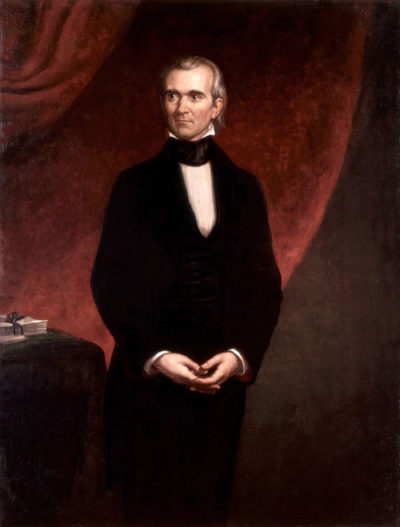
President Polk’s fourth state of the union address in 1848 launched a massive migration westward. In ten years, the white population of California rose from 80 to 300,000 — because the president reported that the rumors of gold in California were true.
Polk said, “The accounts of the abundance of gold in that territory are of such an extraordinary character as would scarcely command belief were they not corroborated by the authentic reports of officers in the public service who have visited the mineral district and derived the facts which they detail from personal observation.”
Abraham Lincoln

Abraham Lincoln’s 1862 address expressed the principles for which northern men would fight and die over the next three years. It also set the bar for state of the union address for what is arguably the best prose ever written by a president:
“The dogmas of the quiet past are inadequate to the stormy present. The occasion is piled high with difficulty, and we must rise with the occasion. As our case is new, so we must think anew, and act anew. We must disenthrall ourselves, and then we shall save our country.
“Fellow-citizens, we cannot escape history. We of this Congress and this administration will be remembered in spite of ourselves. No personal significance, or insignificance, can spare one or another of us. The fiery trial through which we pass, will light us down, in honor or dishonor, to the latest generation…In giving freedom to the slave, we assure freedom to the free. We shall nobly save, or meanly lose, the last best hope of earth.”
Franklin Roosevelt
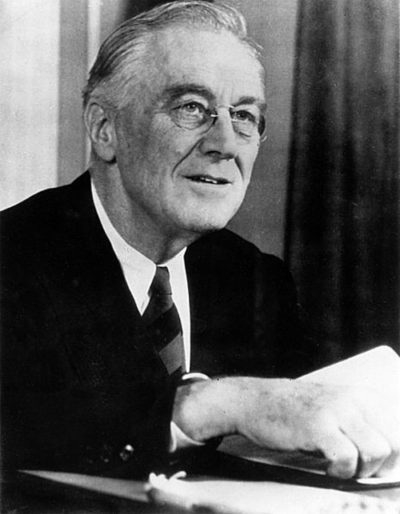
In 1942, President Roosevelt put the country’s wartime goals into words. Achieving these goals would be the full time job for 16 million Americans over the next three years. The U.S., Roosevelt said, was fighting to achieve four freedoms— not just the U.S. but for the entire world.
“Freedom of speech and expression…
“Freedom of every person to worship God in his own way…
“Freedom from want, which… means economic understandings which will secure to every nation a healthy peacetime life for its inhabitants…
“Freedom from fear… a world-wide reduction of armaments to such a point … that no nation will be in a position to commit an act of physical aggression against any neighbor—anywhere in the world.”
Lyndon Johnson
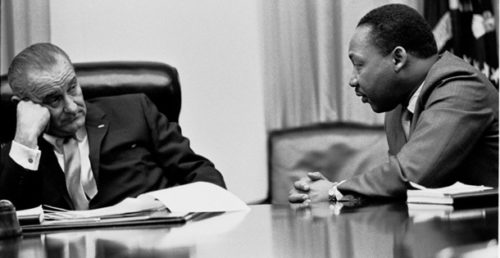
Few addresses touched as many American lives as the 1964 message from Lyndon Johnson, which launched his a highly ambitious “unconditional war on poverty.”
“Our aim,” he said, “is not only to relieve the symptom of poverty, but to cure it and, above all, to prevent it.”
In the months that followed, he pushed legislation that would expand the government’s role in civil rights, education, and health care. It would produce the Office of Economic Opportunity, Job Corps, VISTA, food stamp program, Medicare, and Medicaid.
Bill Clinton

Bill Clinton stunned Congress in his 1996 address when he announced “the era of big government is over.” It was a startling turn-around for the head of a party that had long supported increased government programs to address social ills. In the coming months, Clinton introduced spending cuts that pared back programs and enabled him to announce, in his 1998 address, that the government had balanced its books and was expecting a surplus. “What should we do with this projected surplus? I have a simple four-word answer: Save Social Security first.”
We should also mention, in passing, a few addresses that may not have directly affected Americans’ lives, but contained lines that proved ironic or all too true.
George W. Bush, in his 2003 address, identified Iraq, Iran, and North Korea as an “axis of evil” whose regimes were seeking “weapons of mass destruction.” It was a claim that would come back to haunt the administration when no such weapons were found in Iraq.
In 1974, Richard Nixon was under pressure from the Congressional Committee looking into the Watergate break-in. He told America, “I believe the time has come to bring that investigation and other investigations of this matter to an end. One year of Watergate is enough.” But it wasn’t enough for Congress. Seven months later, Nixon resigned.
In 1975, President Gerald Ford broke with the long tradition of presidents declaring the state of the union was strong. Ford had the courage to honestly say, “I want to speak very bluntly. I’ve got bad news, and I don’t expect much, if any, applause… the state of the Union is not good: Millions of Americans are out of work. Recession and inflation are eroding the money of millions more. Prices are too high, and sales are too slow. This year’s Federal deficit will be about $30 billion; next year’s probably $45 billion. The national debt will rise to over $500 billion.” It was the opening to an address that presented measures he felt would “rebuild our political and economic strength.”
Finally, we should consider George Washington’s report from 1790, which some consider to be the ideal address. It was a concise: a thousand words long. (The longest address was given by President Clinton in 1995: 9,190 words. President Carter’s 1981 report, submitted in writing, exceeded 33,000 words.)
It offered practical advice, was short on flowery language or self praise, and concluded with this essential message that should inspire every president’s address to Congress:
“The welfare of our country is the great object to which our cares and efforts ought to be directed, and I shall derive great satisfaction from a cooperation with you in the pleasing though arduous task of insuring to our fellow citizens the blessings which they have a right to expect from a free, efficient, and equal government.”

Healthy Weight, Healthy Mind: The Difference Between Motivation and Desperation
We are pleased to bring you this regular column by Dr. David Creel, a licensed psychologist, certified clinical exercise physiologist and registered dietitian. He is also credentialed as a certified diabetes educator and the author of A Size That Fits: Lose Weight and Keep it off, One Thought at a Time (NorLightsPress, 2017). See all of David Creel’s articles here.
Do you have a weight loss question for Dr. Creel? Email him at [email protected]. He may answer your question in a future column.
When you’ve failed at weight loss many times, your desire to change can turn into something that seems like motivation but isn’t. Loretta’s story is a good example.
Loretta showed up 15 minutes late for her psychological evaluation for bariatric surgery. I knew little about her aside from the information in her medical records. In her chart, I found that Loretta weighed well over 400 pounds and had diabetes, sleep apnea, arthritis, and low back pain. She checked the African American box on her intake form, and I noticed her address was in the middle of a crime-ridden part of a nearby city. When I met her in the waiting room she rocked backward and then forward while pushing on the arms of the chair in order to get to her feet. She groaned and grimaced with pain while walking with me to my office, barely acknowledging my introduction. She didn’t apologize for being late and seemed uninterested in small talk about weather or traffic. After we sat down, I explained the purpose of the required evaluation was to make sure surgery was a good fit for her, and if so, determine what things she could do to best prepare for the operation.
As Loretta began telling me about herself, it was clear our lives were only similar in the sense that we were both raised without much direct influence from other cultures and races. Her urban speech patterns were unlike mine, and her life was riddled by poverty and family members incarcerated or addicted to drugs. She casually admitted to having a drug problem in the not-so-distant past. On the other hand, I grew up in a Mayberry-like small town insulated from most of the problems found in inner cities.
Although I’ve tried to educate myself about other cultures and interact with people different from me, I can’t change the color of my skin or how I grew up. I could not simply, without invitation, step into Loretta’s world and understand her life. Our differences were important to her and she didn’t want to talk about the thing that was most personal to her—her weight—with someone like me. How could I blame her? After all, it’s hard enough to talk about personal struggles with someone who understands where you come from. Revealing these things to a stranger from a different culture and race adds to the difficulty.
I listened intently to Loretta and paid close attention to her body language. Although I tried hard to connect, she spoke to me with distrust, answering my questions with curt frustration. She was holding her cards close to her chest, afraid if I got a glimpse I’d take advantage of her. She feared I would win the game and taunt her with condescending psychobabble. Like many patients in this situation, she probably believed I’d use her words against her when it came to deciding if she was an appropriate candidate for surgery.
My attempts to convince her we were “on the same team” and I wanted to help did not resonate. I had real concerns that her lack of a support system, combined with financial hardships, would cause problems for her after surgery. Would she be able to afford the vitamins she needed to take daily for the rest of her life? When she couldn’t use food to cope with life difficulties would she turn to drugs again? Although she couldn’t see it, surgery could make her life worse if she wasn’t ready and equipped to make the necessary changes. As I continued to probe about how she would manage various aspects of her life after surgery, she stopped me.
“I don’t like where this is going.”
I put down my pen and stopped taking notes. “What are you concerned about?”
“I want to change my life.”
“How do you want your life to be different?” I asked, as our eyes finally connected.
Her expression softened and her eyes welled with tears. Like the small movement from the torque on a lid of a never-opened jar, I could sense something was about to give way. At that moment I didn’t notice her body that 30 minutes earlier had fallen into the oversized chair, out of breath from walking to my office. I didn’t notice her skin tone or the fullness of her face. Our age difference and dissimilar upbringings were insignificant. I just looked into her eyes and felt the gap between us closing. In a strained, high-pitch voice required to delay an ensuing sob, she quickly exclaimed,
“I can’t even wipe my own ass anymore.”
I didn’t know what to say. There it was, one of the most personal and embarrassing aspects of her life, out in the open. In those few words, she ripped through the veil I’d been tugging at the entire session. But I wasn’t ready for it; I could no longer sustain eye contact. It was like I accidentally saw her naked and was sorry I embarrassed her. As I felt the weight of her troubles, compassion stole my words. I looked down, nodding my head.
“I can only imagine how that makes you feel,” I said, after a long pause.
Her size had robbed her of her dignity. She was angry. As we continued talking, I learned she had been this size for quite some time. She depended on her husband to prepare food and help her dress, bathe, and get into and out of her car. It seemed illogical that up to the point of seeking bariatric surgery, she had done little to change course. How could it be that Loretta, like many other people, hated her situation so much, wanted to change, yet seemingly did nothing about it for so long?
Clearly, Loretta wanted to lose weight. In fact, she told me she’d wanted to lose weight for a very long time. Despite her desire for a different life, I imagine she had misguided family members who said, “When she wants it bad enough, she’ll do it.”
But Loretta’s problem wasn’t lack of desire. She had a strong desire to lose weight, but she wasn’t motivated: Loretta was desperate. A simple comparison will help explain what I mean.
Imagine you’re stranded on an island by yourself. You have sources for food, water, and primitive shelter. You’re happy to be alive, but also desperate to leave the island, interact with other humans, and enjoy a hot shower. Month after grueling month you try everything to escape the island—sort of like the old TV show Gilligan’s Island. After years of failed attempts, you still want to leave, but you’ve given up hope. Deep down you believe nothing will work—and you’re losing motivation. Any new idea to get off the island leads to a half-hearted pursuit before giving up. You’re so demoralized that you can no longer tell the difference between good ideas and dead ends—they all seem alike.
This is the point Loretta reached with weight management. Someone told her about bariatric surgery and she felt so desperate she made an appointment. She wanted to lose weight, had many good reasons to change, but wasn’t motivated. Our conversation revealed that, to her, bariatric surgery was no different than the grapefruit diet, the cold shower and potato diet, or having her mouth wired shut. In her desperation she hadn’t considered how this procedure was different than everything else she had tried.
Because of her perspective, she wasn’t ready to do the work required to be successful with bariatric surgery. When we offered to help Loretta prepare for surgery by changing her diet and beginning a modest physical activity program, she seemingly lost interest. Maybe over time she became motivated and pursued help elsewhere. Perhaps she’s still on her island—I hope not.
Desperation occurs at the intersection of hopelessness and motivation. We want to change, but have lost hope. We consider drastic efforts without truly believing they’ll lead to success, and after a while the drive to change begins to fade away.
Desperation can lead to motivation, but not always. Desperation can also rob us of clear thinking and make us vulnerable to things that will harm us, while safer solutions rest quietly within our reach. Many times people repeat the old saying: “You have to hit rock bottom before you can change.” In other words, life has to get really bad before we’re desperate enough to make changes. This can be true for weight loss, and sometimes it works, but it only works if someone will help you out of the mire and offer a safe, realistic plan. Even then, you must accept the help, believe in the plan, and do your part to make it happen. Otherwise, desperation usually leads to taking whatever someone will give you and hoping things will miraculously work out.
Come back each week for more healthy weight loss advice from Dr. David Creel.
Strikes and Spares
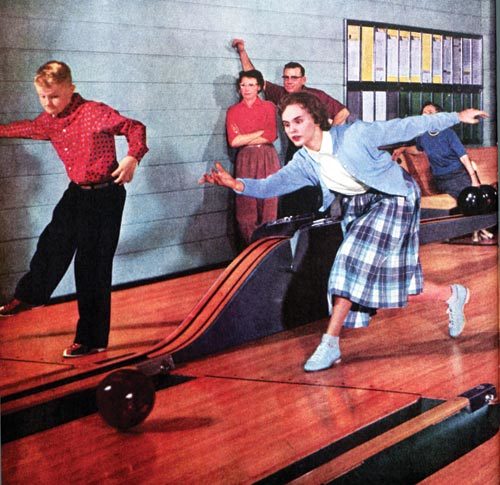
Bowling was invented by cavemen thousands of years ago, and it has been growing more popular ever since. One old story has it that Sir Francis Drake let the Spanish Armada wait while he finished a game. Rip Van Winkle took his long nap near a spooky Catskill bowling resort. Today, the American Bowling Congress estimates more than 22 million Americans bowl about 800 million games a year on 7,880 indoor alleys.
In 1841, gamblers made bowling so disreputable that New York outlawed it. Now it’s a family sport. Take the Lynbrook bowling alleys on Highway 100, in Minneapolis. Blair McKinley (left) came with his parents (leaning against the wall). Tona Erickson, the plaid-skirted teenager, had a bowling date with a boy.
Neon décor, luxury snack bars, and automation mark the bowling greens of today. Some of the fancier, million-dollar tenpin palaces look like nightclubs and maintain nurseries for children too young to bowl. Which all goes to show that man, the master of the universe, is still child enough to take his pleasure in a Stone Age game.
—Face of America,
May 24, 1958
This article is featured in the January/February 2018 issue of The Saturday Evening Post. Subscribe to the magazine for more art, inspiring stories, fiction, humor, and features from our archives.
The Unlikely Superhero of the Jungle
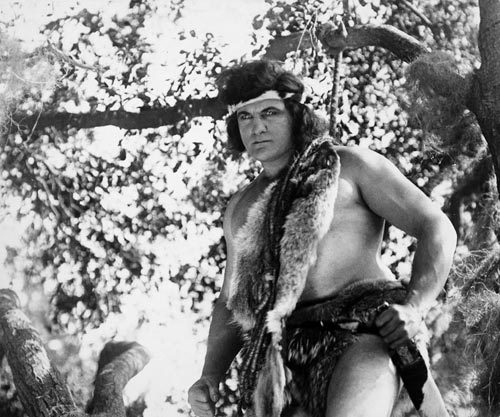
A century ago, the country’s hottest — and unlikeliest — action star was Elmo Lincoln in the role of Tarzan. Tarzan of the Apes premiered at New York’s Broadway Theatre 100 years ago on January 27, 1918.

To mimic the indeterminate African jungle of Edgar Rice Burroughs’ story, the film was shot in the swamps of Louisiana. Certain scenes were filmed in Brazil, such as the movie’s opening shots of lions, wild boars, snakes, and alligators. When it came to the apes responsible for raising the orphaned Tarzan, some extras were hired from the New Orleans Athletic Club to don monkey costumes and swing from the trees.
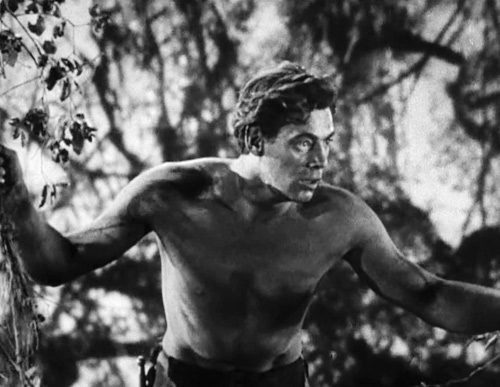
Turner Classic Movies’ Leonard Maltin called the film a “surprisingly watchable and straightforward telling of the Greystoke tale, though Lincoln looks like he’s about fifty years old, with a beer belly to boot.” Elmo Lincoln had a heftier physique than the 1930s and ’40s Tarzan played by Olympic swimmer Johnny Weissmuller, but he reprised his role in two more movies (The Romance of Tarzan and The Adventures of Tarzan). Lincoln was never again able to achieve film stardom, however, as he was thereafter relegated to small parts.
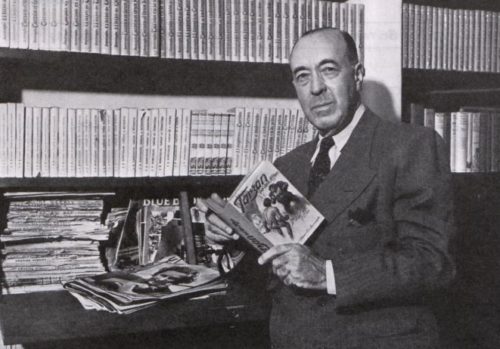
Edgar Rice Burroughs, the author of the wildly successful books, was an unlikely sensation himself. As our own Jeff Nilsson points out in “How Tarzan’s Author Did It All Wrong, and Got It Right,” Burroughs’ stories about the lord of the jungle broke countless literary and marketing rules, and they were filled with plot holes and leaps in logic. If Tarzan’s self-taught literacy is plausible, perhaps it follows that he could travel through time to fight medieval knights or Roman gladiators.
The 1939 profile of Burroughs in this magazine, “How to Become a Great Writer,” detailed Burroughs’ business failures that ultimately led him to sleepless evenings scrawling adventure stories in his apartment. The author’s imaginative writing seemed to benefit from its lack of accurate detail: “He had located his first novel on Mars because nobody knew the local color of that planet or the psychology of the Martians, and nobody could check up on him.” The same was true for Burroughs’ unspecified apes of the Tarzan series, although most have interpreted the anthropoids to be gorillas.
Burroughs seemed so ill-suited to his literary fortune that reporter Alva Johnston gave a revised list of tips for writers hoping to mimic the Tarzan-creator:
- Be a disappointed man.
- Achieve no success at anything you touch.
- Lead an unbearably drab and uninteresting life.
- Hate civilization.
- Learn no grammar.
- Read little.
- Write nothing.
- Have an ordinary mind and commonplace tastes, approximating those of the great reading public.
- Avoid subjects that you know about.
Even though he was no Oscar Wilde or Noel Coward, Burroughs created one of the most recognizable characters of the 20th century. Tarzan has appeared in movie theaters about 100 times, most recently in the form of Alexander Skarsgård in 2016. Given another century, the ape-raised warrior could grace the silver screen again and again, a far cry from his pulp fiction beginnings.
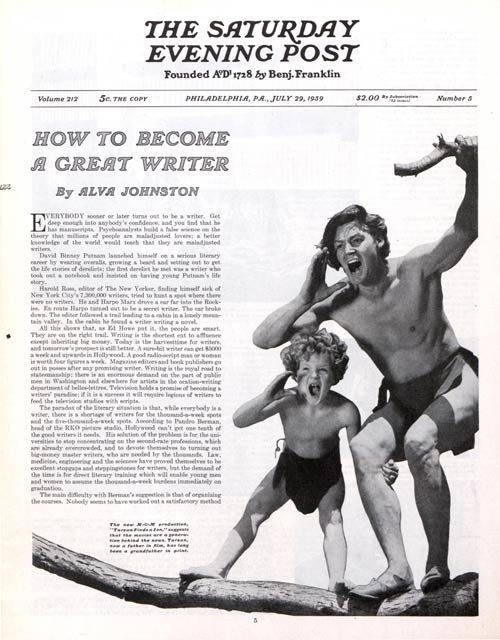
Movies for the Rest of Us with Bill Newcott: Flicks for a Cold Winter Night
Join our movie review video podcast, Movies for the Rest of Us with Bill Newcott. This week, Bill reviews movies that are worth curling up with on a cold winter night, including Hostiles starring Christian Bale, Wes Studi and Rosamund Pike; and The Clapper with Ed Helms, Amanda Seyfried, and Tracy Morgan. He also reviews his home video quick hits: The Killing of a Sacred Deer, Geostorm, Goodbye Christopher Robin, and The Long, Long Trailer.
Skyscrapers
Two seconds before Kate’s face smashed into the sidewalk, she closed her eyes and imagined she was flying. Maybe if she’d kept them open, she would’ve seen the pebbles on the path. She would’ve turned her handlebars in time.
Two hours before Kate’s face smashed into the sidewalk, she looked out the window of a restaurant on Broadway to see if her Schwinn and Amanda’s Trek were still chained to a bike stand. They were. Perhaps, after lunch, they should’ve gone Black Friday shopping instead.
Two weeks before Kate’s face smashed into the sidewalk, she and Amanda rehearsed The Nutcracker Suite on the golden stage of Carnegie Hall. She rested her chin on her violin and gazed out, imagined what she would see in a month: all those wine-colored seats filled, row upon row, tier upon tier. Imagined what she would hear: thousands of hands coming together in rattling applause.
The day after Thanksgiving, the weather turned unseasonably warm. Kate neglected to wear a bike helmet and she closed her eyes for two seconds. She couldn’t take any of that back now.
So there she was, her face pressed against craggy concrete, a fountain trickling nearby, lots of voices, a distant siren. It became louder, then cut off just as it was about to reach another crescendo.
A moment later, a man’s voice rose above the others: “Make room.” Kate rolled over and saw furrowed brows and gaping mouths and heard a gasp or two.
“I’m right here, Katie.” Amanda hovered over her right shoulder, a Trek leaning against one hip and a crumpled Schwinn against the other.
With blood gurgling through her lips, Kate said, “My teeth.”
“What about your teeth?”
“Are they still there?”
A paramedic pushed Amanda aside, a hot African American man with dreadlocks and a square jaw. He pointed a small flashlight at her eyes and asked if she knew her name. He had a deep, sexy voice. Kate might have flirted with him if she hadn’t been lying on a sidewalk with a smashed-up face.
#
Forty-three stories above the sidewalk, the white sky sent millions of snowflakes drifting downward. White sky. White snow. White tape erasing half of Kate’s reflection: her nose, cheeks, and forehead. A white Colonel Sanders beard, and — as if all that weren’t enough — a black mustache sewn above her upper lip. Purple smears encircled her eyes like applications of eyeshadow gone awry.
At least she’d kept all her teeth.
“You’re very lucky,” the attending in the E.R. had told her. “Your face took all the impact. No broken bones, other than your nose.”
“My elbow hurts.”
“It’s just sprained. It’ll feel much better in a day or two.”
“Then I’ll be able to play violin?”
“Sure. I don’t see why not.”
The following morning, while going over her discharge papers, the plastic surgeon had a different opinion. “You’ll need a month or two for that skin graft on your chin to take,” Dr. Klatsky said. “Give your violin a rest for a while. Just until you’re fully healed.”
Right now, Amanda and the rest of the orchestra were rehearsing at Carnegie Hall without her. New Yorkers were stomping through freshly fallen snow, oblivious to a waylaid violinist staring through a window 43 stories above them.
In the background, yet another radio newscaster was reporting on the weather. “… as an early December storm comes on the heels of a late November heatwave …”
Kate didn’t want to think about the late November heatwave that had landed her in this predicament in the first place. She rose to replace inane news coverage with a classical music station, then noticed a face in a window on the other side of Lexington Avenue. A bald child was staring at her.
So many questions, like so many snowflakes, fluttered into her head. Was the child a boy or girl? What devastating illness had taken this child’s hair?
That they were maintaining eye contact felt both wrong and right. Under normal circumstances, it might’ve seemed rude to stare, but these two had both been physically altered. They had that in common.
The child left the window, and Kate slipped into an unexpected and enduring guilt for having compared her temporary pain to that of a child who could very well be terminally ill.
#
In the morning, her cell phone rang. A recorded message came on: Due to the heavy snowfall, Dr. Klatsky’s office will be closed until Monday. Normally, she would’ve welcomed a canceled appointment, but she had been looking forward to having her stitches removed today.
With the cell phone still pressed to her ear, she went to her window and pushed aside her curtains. The cars parked along Lexington were packed in by snow, enough to cover their wheels. A plow was pushing the gray-and-white mess from the road to the curb, further stranding those who’d been unfortunate enough to park there. A yellow cab crept along in the plow’s tracks.
With a sigh, Kate lowered her phone and raised her gaze. That was when she noticed the bald child waving to her from the window across the avenue.
Kate waved back.
Immediately, a pink poster board filled the window, bearing a 10-digit number followed by TXT ME.
Reflexively, Kate lowered her cell phone to her hip, as if that would conceal its existence. Perhaps the child was waving to someone a floor or two below the 43rd, or a floor or two above, or …
No. The pink sign had been removed and even from the distance separating the two buildings, Kate detected a hopeful expression on the child’s face. She was being rude to someone young and sick and bored. She looked down at her phone, punched in the phone number, and texted:
••• Hi.
••• What happened to your face?
For a few seconds, Kate had forgotten all about her face.
••• Wrecked my bike.
She waited. No response. Should she say more about the accident? Or was it her turn to ask a question? And if so, how could she go about doing that? She couldn’t very well text What happened to your hair?
The child did not wait to be asked.
••• I have leukemia.
Trying to suppress tears made Kate’s upper lip and chin throb.
••• Can’t go out.
••• I’m sorry.
••• Thx. Sorry bout your bike.
••• & your face.
A tear landed on Kate’s fingertip. She rubbed it onto her shirt and typed.
•• I’m Kate.
••• I’m Chloe.
She had already come to the conclusion that she was communicating with a girl. Maybe because of the pink poster board.
••• How old are you, Chloe?
••• 12.
••• Hey, do you know where the biggest Xmas tree in the USA is?
••• NYC?
••• Wrong!!!!
A man wearing a surgical mask and cap appeared at Chloe’s side, bringing the exchange to an abrupt end. Kate ducked down, crept backward away from her window. She reread the conversation, saw nothing that could be considered predatory other than the fact that she’d sent the first text. Her heart rate galloped as she grabbed her keys and left her apartment, with no clear plan of where she was going.
For a week, she had hidden in her tiny efficiency; now that no longer provided adequate coverage. Her one venture out — last Friday, to check the mailbox on the first floor — had resulted in a little boy crying at the sight of her hideous face and a small girl burying her eyes against her mother’s skirt.
Kate’s mailbox was probably overflowing by now. She summoned the elevator, hoping not to have to share it with a young child whom she could frighten just by turning her head.
The elevator doors opened to reveal not one but two small children, a boy and a girl, bundled in snowsuits and mittens and colorful boots. The little girl glanced at Kate; the boy stared, but at least did not appear to be on the verge of tears. The mother, while pressing the lobby button, said, “You live on 43G, don’t you?”
“Yes.” Kate wondered how her neighbor knew this.
“I’m on 44G. I live directly above you. I hear you playing your violin sometimes, and I saw you leaving the building with a violin case the other day.”
Well, it couldn’t’ve been “the other day” because Kate hadn’t played her instrument since the day before Thanksgiving, but she confirmed that she was the musician in 43G.
“You play very well. Are you in an orchestra?”
“Well, yes.” No sense in going into all the details.
The doors opened on 39 and a middle-aged couple boarded. They looked at Kate and immediately down at the floor. At the back of the elevator, the little boy and his sister smiled at her, so she smiled back, forgetting that this would inflict pain above her lips. “Are you going out to play in the snow?” Kate said.
Nods from both children.
Maybe Chloe wished she could play in the snow. Maybe that was why she’d been staring out the window.
On the 28th floor, two old women wearing fur-trimmed boots boarded. One of them interrupted a conversation with the other and pointed to her own soft face. “That must’ve hurt quite a bit.”
“Yeah, quite a bit,” Kate said.
“You let us know if there’s anything we can do for you, young lady. I’m Lily. Rose and I, we live in 28E. Right across from the elevators.”
Kate flinched as another attempted smile tugged the stitches that should’ve been coming out this morning. “Thank you for the offer. That’s so nice.”
“We mean it. Don’t we, Rose? Anything at all. We’re just on our way to the market for cocoa. You can’t very well be stuck in a snowstorm without cocoa, can you? You want us to pick some up for you?”
Kate already had four expired boxes of Swiss Miss in her cabinet. She did need fresh milk, but was not about to ask two old women to carry a half gallon jug in the snow. “Thank you. No. I think I have everything I need.”
The middle-aged woman from 39 turned to Kate; her blonde curls mingled with the faux fur trim of her hood. “I broke my nose when I was a teenager. Hurt like the dickens for weeks. I hope you heal quickly.” She looked up at her husband as if he’d said something.
When the elevator reached the lobby, the children ran off with stiff, snowsuit-covered legs. Their mother followed, then the middle-aged couple, smiling at one another as if sharing a fond memory of when their own children were young. The two old women flanked Kate as she walked to the mailboxes, then left her alone with one more reminder that their apartment number was 28E and they would gladly help her any time at all.
As predicted, Kate’s metal mailbox was stuffed with bills and get-well cards. She shouldn’t have waited a week to check her mail. Maybe she wouldn’t have if she’d known she lived in a building with such kind neighbors.
#
Chloe’s next message appeared that evening, when Kate was eating dinner at her kitchen counter.
••• Well? Did you guess it yet?
Kate looked back at the last few sentences preceding this.
••• You mean the biggest Xmas tree in the USA?
••• Right.
••• Guess I should’ve googled that by now.
•• It’s in AZ, about 1 1/2 X as big as Rock Cntr.
••• And Rockefeller Center is second?
••• 3rd or 4th.
••• Have you seen the one at Rockefeller Center?
••• No but I’ve always wanted to.
Kate reread that sentence, written by a very sick girl confined to her apartment.
••• Back in Finzione, TN, the biggest tree we ever had was < 20 ft. Lame.
••• I can go to Rockefeller Center and take a pic for you.
Kate held her breath as she pressed Send. The last thing she wanted to do was go anywhere in the city with her mangled face. But it would be worth it if it could make a sick child smile.
••• Thx. My dad already did that for me.
••• It was nice of him but not the same as the real thing.
••• But thx.
Another pause. Kate flipped on her living room light and wandered to the window. Yellow light shone from Chloe’s apartment.
•• Have you been in NYC long?
••• Since Sept.
••• My mom’s idea.
••• She’s a doc. Knows the best oncologists here.
Kate stared at her screen for a while before typing:
••• Hope you get well.
She quickly added:
••• Soon.
••• Thx.
••• Wanna wave?
••• Sure. Already here.
Chloe appeared and waved from her illuminated window, unaware that the window below hers had been trimmed in white chasing lights, and that the one above had been decked out in lights that changed colors every few seconds.
Kate began to wonder if any decorations had been added to the windows of her own building in the two weeks since she’d last been outside.
#
The idea came to her on Monday, on her way home from the plastic surgeon’s office, as she was slip-sliding across Lexington Avenue. It did not hit her all at once, like the slush that splattered her parka when a bus passed by, but rather, developed over the course of the afternoon.
She’d spent an hour and a quarter on a waiting room chair, looking over some of the texts that Chloe had sent throughout the weekend. On Saturday, Chloe had asked:
••• Know how tall the Emp St Bldng is?
••• Over 100 stories?
••• I mean how tall! How many ft!
••• Then IDK
••• 1454 ft to the tip.
••• Wow!
••• My bldg is 650 ft tall
••• You climbed it and measured it?
••• Hahaha. I calc it.
••• So if the building I live in has 50 stories…
•• Then it’s almost 550 ft
••• That was fast!
••• I’m good at math.
On Sunday, Kate had given Chloe a pop quiz, just for fun:
••• Ok. The height of Mt. Everest is…
••• Too easy! > 29000 ft.
••• You are good. I can’t keep up with you.
••• 🙂
••• Tallest bldg in Finzione is 108 ft.
••• Lame.
••• So my building is 5X bigger than TN.
••• U R good!
The man with the surgeon’s mask appeared by Chloe’s side.
••• Your doctor?
••• LOL my dad.
The woman whom Kate presumed to be Chloe’s mother appeared at the window later that afternoon, also clad in surgeon’s mask and cap. She waved to Kate, looked down at her daughter, and a moment later, Chloe was texting:
••• GTG
At least it seemed that Kate’s communications with a 12-year-old had been sanctioned by her parents.
By the time she returned home from her appointment with Dr. Klatsky on Monday, the sun had already started to set. On the fourth floor of her 50-story apartment building, a candle burned in the window. Not an electric or battery-operated candle, but a real one, its flame shimmying from side to side.
With one boot in a slush puddle in the middle of Lexington, and the other seeking traction, and 12-11-10 seconds remaining to clear the crosswalk, the idea swooped into Kate’s head.
Upstairs, she dumped everything onto her bed — purse, coat, hat, and gloves — grabbed sheets of paper, a ruler, pen, and yellow highlighter, and set to work at the kitchen counter.
She worked through dinner and into the night, plotting on a grid, 15 squares across and 50 squares high. Twice she had to start over. One time she was interrupted by a text from Chloe:
••• Lemme see your face.
••• I still have a mustache.
••• Now it’s made of red scabs instead of black threads.
••• U can hardly tell from here.
••• When does the rest come off?
••• My new nose will be revealed on the 20th.
••• Just in time for Xmas.
Christmas was less than three weeks away. If only Chloe knew the surprise Kate had in store for her. After their text exchange, she started highlighting the squares on her grid. Each represented a window. She highlighted all the squares on the first five floors, all but the squares at either end of floors 6 through 10, all but two squares at either end of 11 through 15, and so forth in five-floor increments, until she had formed a yellow triangle. Or an eight-tiered wedding cake. Or, if she squinted just so, a Christmas tree. Maybe she could figure out a way to create a star above her window.
This might just work.
Or not.
She spent the night talking herself out of executing the idea, and the following morning coaxing herself back in.
When Amanda heard Kate’s plan, she wanted to be part of it.
“I’m thinking we should do it on the 21st,” Kate told her. “After that, a lot of people’ll be going away.”
“That’s opening night.”
An ache squeezed in behind the metal cast on Kate’s nose. How could she have forgotten?
“You’re coming, right?”
Her cast would be removed on the morning of the 20th; maybe she would look presentable the following evening. Or not. “Of course.” The ache spread to her upper lip. She would be listening to The Nutcracker from a seat, not the stage.
“We can do it on the evening of the 20th,” Amanda said. “I have rehearsal that morning.”
“Good. The 20th.”
“At seven o’clock.”
“Right.”
“This might just work.”
Or not.
They composed a letter together, instructing residents facing Lexington Avenue to shut their lights off and to center a lit tea candle in their windows at 7 o’clock on the 20th. They printed up enough copies of the letter to deplete Kate’s toner. A handwritten note explained the plan in more detail, that the intention was to create a 50-story Christmas tree for a child with leukemia, and that only designated residents would be asked to light a tea candle. They wrote several copies of this and taped them around the lobby. Those lighting candles would be contacted in person, the note said.
Easier said than done. Some neighbors had two windows facing Lexington Avenue, others three. Kate would need to knock on doors, ask questions. Or maybe she could leave the requisite number of candles outside the elevator on each floor, with a note, and let the residents work it all out.
“All I know is that I need to pick up 320 candles,” Kate told Amanda. “I checked online and found a place that has them for a good price. In SoHo. Guess I’ll just have to subject some more New Yorkers to my face tomorrow.”
“That’s all in your head, Katie.”
“Not really.”
“I thought you said your neighbors’ve been so nice whenever you go down to check the mail.”
“Yeah, well …” Amanda hadn’t seen the way half the passengers in her subway car had averted their eyes, before and after her appointment yesterday.
“Don’t worry,” Amanda said. “I’ll pick them up. Right after rehearsal. I’m done at noon. I’ll bring them over, and we’ll figure out a way to start distributing them.”
Amanda’s offer elicited a different sort of pain, this time in the center of Kate’s chest. If she hadn’t closed her eyes for those two seconds, then tomorrow, they would both emerge from Carnegie Hall at noon, a violin case in Kate’s hand and a cello case slung over Amanda’s shoulder, one or both of them humming “The Dance of the Sugar Plum Fairy.”
#
The door to Apartment 4K opened just as Kate thought she would clear the first five floors without having to endure any human contact. She picked up the paper she’d been about to slide beneath the door, and handed it to the woman standing in front of her.
“I saw your note in the lobby,” the woman said. “I want to light candles, but …”
Kate pointed to a bag of 15 candles hanging by the elevator.
“I was about to say, I want to light candles, but I’ll be out of town that week.”
Kate suppressed a sigh. How many other residents would be out of town on the 21st? This Christmas tree could very well bear no resemblance to a tree at all.
“You know what? I’ll just leave a key with my neighbor across the hall, and she’ll light the candles. Problem solved!”
The woman’s idea — for which she credited Kate, although Kate hadn’t opened her mouth once through its inception — solved similar dilemmas for the residents of Apartment 10C and 12G. By the time she’d reached the 15th landing of her building, Kate was done for the day. She felt both exhausted and exhilarated from climbing steps and speaking to neighbors, who unanimously responded with enthusiastic support. The bottom of her chart was quickly filling with smiley faces from those who’d committed to participate.
It was not until Kate had reached the 24th floor, the following day, that she encountered any resistance. A gruff man in 24I did not appreciate the intrusion, and no, he wasn’t sure if he’d be around on December 20, and maybe next time Kate would read his No Solicitors sign before knocking on his door. After he slammed his door, she shrugged and retreated to her apartment, where she opened a bottle of wine and placed a frowny face over the two squares representing his apartment. All that mattered was that many candles would be lit. Enough, it seemed, to provide Chloe with some sort of festive shape, be it tree-like or otherwise.
A handful of neighbors cringed at the sight of Kate’s face, or intentionally turned away while continuing to carry on a conversation; their reactions, in the end, were as inconsequential as that of the gruff man from 24I. In fact, those who were concerned for the sick child and eager to help far outnumbered those with negative reactions. As she ascended her building, Kate had fewer and fewer doors to knock on, but the stakes were rising. More people were depending on her to pull this off.
She was feeling fairly good about her mission — and its chances for success — when she knocked on the door to 28E and accepted an invitation from Rose and Lily to come in for a cup of cocoa.
“How is the child?” Rose said, while Kate swirled melted marshmallow through foamy chocolate.
The truth was that Kate had received few texts from Chloe in the past few days. And Chloe’s health had never entered into any exchanges after their first. Mostly, the pair compared facts and figures, expanded one another’s knowledge of trivia. Admittedly, there were few questions to which Chloe did not know the answer.
“I think she’s okay.” This based on Kate’s observation that, earlier in the week, she’d detected glints of blonde hair. And that even from 75 feet away — the width of Lexington Avenue, Chloe had informed Kate last week — the young girl’s smile radiated light.
Kate sent a text that evening:
••• How are U?
The “U”, she realized, implied casualness. Perhaps she’d been influenced by Chloe’s use of abbreviations.
No reply came for a few days. And even then, it did not answer the question, but instead, asked a new one:
••• Do you know where the world’s biggest nativity scene is?
Kate had no idea. It turned out to be in Manarola, Italy.
At least Chloe had texted. That had to be a good sign.
Kate remained focused on creating the tree and sent Amanda in search of battery-operated flashing lights that could configure a star in the windows of some of the apartments directly above hers.
#
When Kate returned from her doctor’s appointment on the 20th of December, Amanda was waiting for her in the lobby. “Katie! Your nose looks great!” she said with over-the-top enthusiasm, as if she’d been rehearsing.
The truth was that her nose did not look great at all. It was still swollen and bent in the center. Dr. Klatsky said the swelling would go down, but mentioned nothing about the bend. Kate would just need to get used to it, she supposed, as well as the blue scar on her chin and the way the skin behind her upper lip draped down over her teeth when she smiled. All of that would improve in time, she’d been told. In the end, none of that mattered. She’d been lucky. Her injuries could’ve been far worse.
Upstairs, they talked about the next night’s concert. Kate had pre-performance jitters, but she couldn’t quite understand why. “I’m more nervous about The Nutcracker than I was before the last concert, you know, the one I actually performed in.”
“Meanwhile, I’m almost as nervous about tonight as I am about tomorrow,” Amanda said.
One hour left.
Amanda told Kate to send a text already.
“You think? I was going to wait till the last minute, increase the drama level a little.”
“Text her.”
She texted:
••• Hi Chloe. Come to your window at 7.
She waited.
Three dots inside a bubble. Chloe was texting. The child might not even be home.
••• Ok.
Kate released a suspended breath.
Through the next hour, the pre-performance jitters all but vanished. There was nothing more she could do now but wait, and light one candle. The topmost candle of the Christmas tree. And with any luck, 12 neighbors upstairs would remember to turn on their flashing bulbs, and more than a hundred neighbors below would remember to strike a match.
Seven o’clock.
Showtime.
Like a conductor waving a baton, Amanda pointed to the window, and Kate lit the wick of her tea candle.
And waited.
There could be no doubt that Chloe had watched. She had texted “Ok.”
The only question was whether or not this coordinated effort looked like a Christmas tree, or a sparkly mess.
She continued to wait.
••• Hi Kate.
All that waiting for two words.
More typing from the other end.
••• This is Patti.
••• Chloe loves your tree.
••• She says to tell you ‘biggest tree in the USA’
••• And that I should add lots of exclamation points.
Amanda stood over Kate’s right shoulder, just as she had on the afternoon of the accident, wearing the same expression: furrowed brows, clenched jaw. Disbelief.
This couldn’t be happening.
••• She said 5 X bigger than AZ.
Kate didn’t know how to phrase the many questions ricocheting through her mind. She started with:
••• How is…
But before she could complete her sentence, another text came from Chloe’s phone.
••• Why don’t you come over? She says you have to see this.
••• Apartment 45B.
The two friends began to speak at once.
Kate: “Do you want to …?”
Amanda: “Go on, Katie.”
“But don’t you want to come with me?”
“I’ll go outside in a little bit. Go on. Chloe is waiting for you.”
Her heart hammered in her chest. The elevator doors opened; six neighbors stood inside. Kate recognized half of them; she had given them flashing lights. But they didn’t recognize her, maybe because she no longer had tape covering half her face.
The elevator continued to stop at several more floors; by the time it reached the lobby, it was at full capacity. And still no one recognized her, or perhaps they hadn’t looked carefully enough. They all seemed determined to get outside, to turn around and see what they had done.
Kate joined a crowd crossing Lexington Avenue, but when she reached the sidewalk on the other side, she did not turn around. She continued to face forward as she climbed two steps at the entrance of Chloe’s building. The temptation to look behind her was great. Overwhelming, in fact. But the need to see the Christmas tree from Chloe’s window — through Chloe’s eyes — far greater.
She opened the door.
News of the Week: Failed Resolutions, Big Asteroids, and the Right Way to Make Snow Cream
Lose Weight! Exercise! Save Money!
So here we are at the end of January. Dumped your New Year’s resolutions yet?
According to one study, 80 percent of all resolutions fail by February. If you assume that number is a little on the high side, even 60 percent would still be a big number. I would guess that a lot of the failure isn’t because people are weak and don’t have willpower; it’s because they make unrealistic, vague resolutions (“I’m going to lose weight!”) instead of smaller, more concrete ones (“I’m going to stop eating cupcakes for dinner!”). I also think a lot of people don’t actually make a decision to stop their resolutions; they just forget about them or organically fall into old habits.
I’m happy to say that I’m still holding firm with my resolutions, which will remain a secret, because when February rolls around and I’ve abandoned them I can deny everything.
2002 AJ129
I don’t want to alarm anyone, but there’s a 0.7-mile-long rock traveling 67,000 miles an hour and it’s heading toward Earth.
The asteroid, with the catchy name 2002 AJ129, is going to pass really close to us on February 4. It will come within 2.6 million miles of Earth, and NASA, which has declared the asteroid “potentially hazardous,” says that’s actually too close for comfort. Luckily, it’s not going to hit us or cause any other problems.
Here’s what NASA has for a plan if an asteroid is going to make a direct hit. It’s not incredibly comforting, but at least it doesn’t involve calling Bruce Willis.
Forgot Your Password? Click Here
In other near-apocalyptic news, remember a couple of weeks ago when the state of Hawaii sent out a false warning that missiles were headed toward the Aloha State? This week, it was revealed that the reason why it took Governor David Ige a while to correct the error on social media was because … he forgot his Twitter password. Other officials (and even ordinary citizens) had already tweeted a correction by that time, but it still took 38 minutes for an official correction to go out.
By the way, the lesson from this isn’t “Officials should remember their Twitter passwords,” it’s “Officials shouldn’t rely on Twitter to tell people of a possible nuclear war.”
RIP Bradford Dillman, Ursula K. Le Guin, Dorothy Malone, Naomi Parker Fraley, Hugh Masekela, and Connie Sawyer
Bradford Dillman was a veteran actor who appeared in movies like Compulsion and The Way We Were and many TV shows, such as Court Martial, Dr. Kildare, and Murder, She Wrote. He died last week at the age of 87.
Ursula K. Le Guin was an acclaimed fantasy and science fiction writer known for such works as The Left Hand of Darkness and the Earthsea series of books. She died Monday at the age of 88.
Dorothy Malone played the mother on Peyton Place and won an Oscar for her role in Written in the Wind. She also appeared in movies like The Big Sleep, the Dean Martin/Jerry Lewis comedy Artists and Models, and Basic Instinct. She died last Friday at the age of 92.
It was revealed in 2016 that Naomi Parker Fraley was the real model for Rosie the Riveter, the iconic, strong woman seen on WWII posters by artist J. Howard Miller, even though other women made the claim over the decades and confused everyone. She died Saturday at the age of 96.
Here’s the equally famous Norman Rockwell Rosie the Riveter cover from the Post, which featured another Rosie, a 19-year-old phone operator from Arlington, Vermont, named Mary Doyle Keefe. During the war, Rockwell’s painting and his “Four Freedoms” toured the country raising money for war bonds.
Hugh Masekela was an influential jazz musician and anti-apartheid activist from South Africa known for many solo albums, playing the Monterey Pop Festival in 1967, and touring with Paul Simon for Simon’s Graceland album. He died last week at the age of 78.
You’ve seen Connie Sawyer dozens of times on TV and in movies, even if you didn’t know her name. She didn’t start acting until she was in her 40s (she is often credited as “old lady”) and appeared in everything from The Andy Griffith Show, Seinfeld, and The Office to films like When Harry Met Sally, Out of Sight, and Dumb & Dumber. She died Sunday at the age of 105.
The Best and the Worst
The Best: My favorite story this week has to be about Clarence Purvis, who has lunch with his wife every single day. You say that doesn’t sound too special? Watch Steve Hartman’s On the Road segment below and you may think differently.
The Worst: Nielsen has stopped using paper diaries to gather its ratings information. Now, you may wonder why they didn’t stop using paper diaries a decade or more ago in this age of computers, but I was happy to see that they lasted this long. I’m sure no one else cares about this, but I’m a little sad that yet another paper thing is going away (paper can also be used to keep track of your Twitter password).
I’ve never met a Nielsen family before (and I bet you haven’t either), but my family was an Arbitron family for a week when I was a kid. They were another TV and radio ratings company. We got a paper diary in the mail and since I was the one who watched the most television, my mom told me to keep track of what we watched. I’m pretty sure I just put down all of my favorite shows, whether I watched them that week or not, because I didn’t want them to get canceled.
This Week in History
FDR Begins Fourth Term (January 20, 1945)
The inauguration for Roosevelt’s fourth term was a more low-key event than usual because of World War II. The ceremony took place on the White House’s South Portico lawn.
Roosevelt died just three months later and was succeeded by Harry Truman.
Apple’s “1984” Commercial Airs during Super Bowl (January 22, 1984)
Most people think the commercial that introduced the Macintosh computer aired only once, during the 1984 Super Bowl. However, it actually aired one other time, on a local TV station in Twin Falls, Idaho, a few weeks earlier — on December 31, 1983, so it would qualify for the year-end awards.
This Week in Saturday Evening Post History: Snowy Ambush (January 24, 1959)
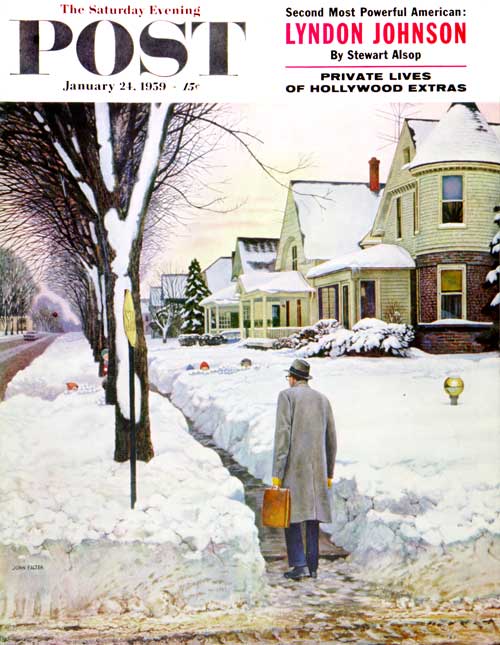
John Falter
January 24, 1959
This cover by John Falter is one of my favorites, even if I didn’t understand what was going on until I saw the picture in a larger size (and even then it’s brilliantly subtle). There’s a reason the man with the briefcase is hesitating before going down the sidewalk, and it’s not fear of slipping.
How to Make Snow Cream
The Falter cover above features a lot of something you need to make the Southern and Canadian dessert known as Snow Cream: snow. No, not something that looks like snow or has the same consistency as snow; I mean actual snow that you probably have in your backyard or on your front stoop this very moment. This recipe includes sweetened condensed milk and vanilla.
I don’t know if I’m going to make it anytime soon, but you can’t help but love a recipe that includes as an ingredient “8-12 cups of fresh, white, new-fallen snow.”
Next Week’s Holidays and Events
60th Grammy Awards (January 28)
Neil Diamond, who this week announced that he was going to stop touring because he has been diagnosed with Parkinson’s disease, will receive this year’s Lifetime Achievement Award. It airs Sunday at 7:30 p.m. on CBS.
National Puzzle Day (January 29)
To celebrate the day, maybe you can try to crack these puzzles from the January 18, 1873, issue of the Post. Or maybe try to figure out copy editor Andy Hollandbeck’s Logophile Language Puzzlers. I just want to know why Diane stole a stereo.